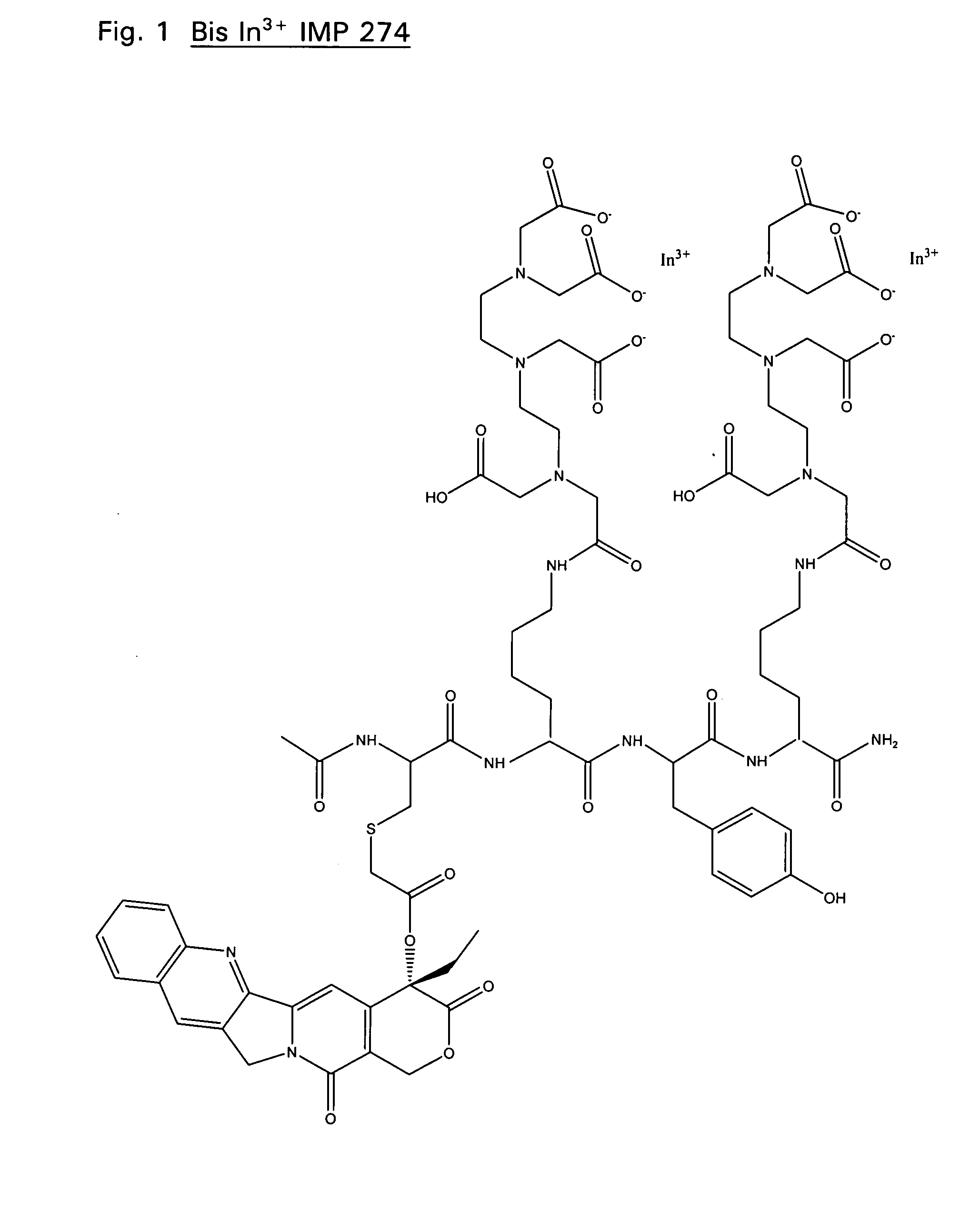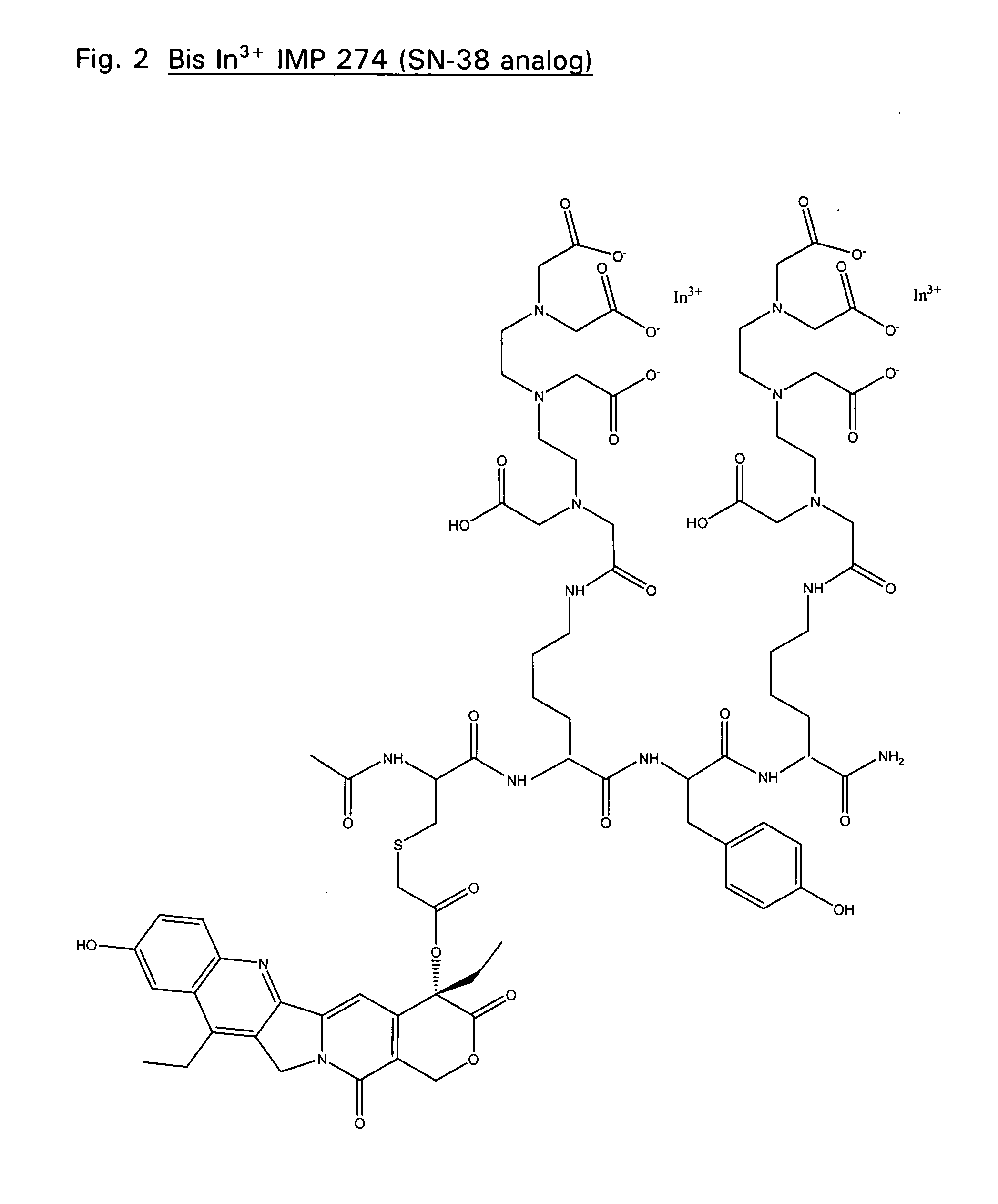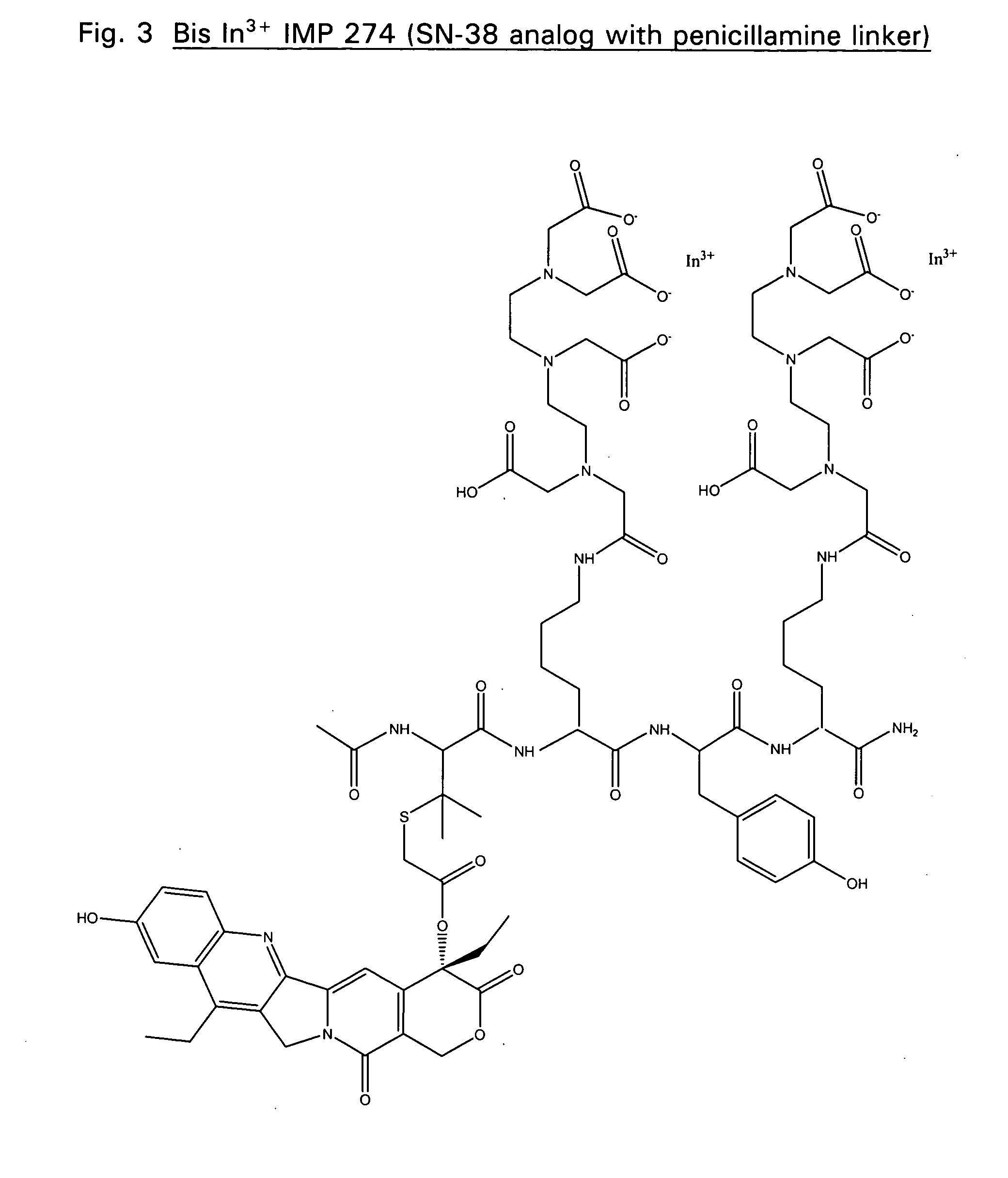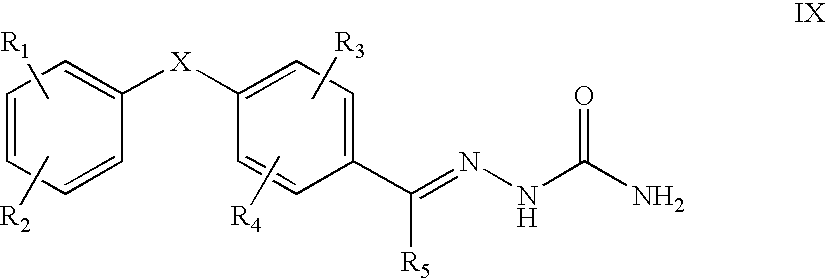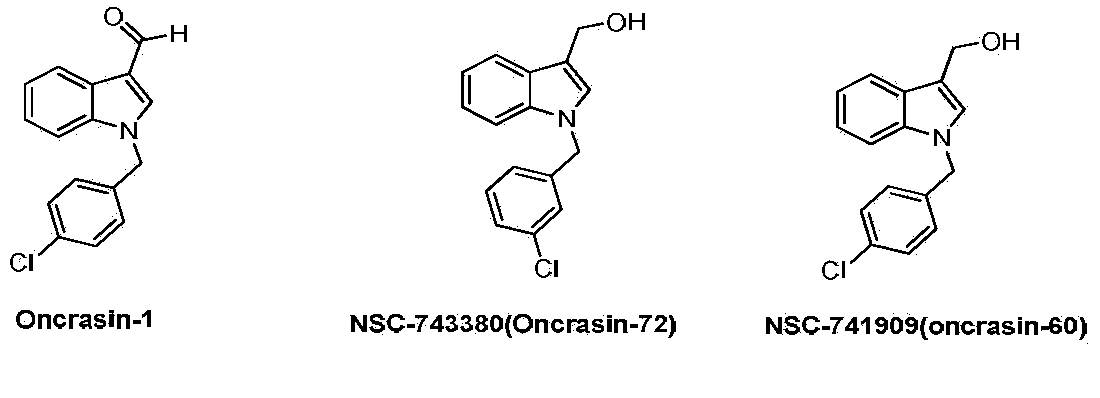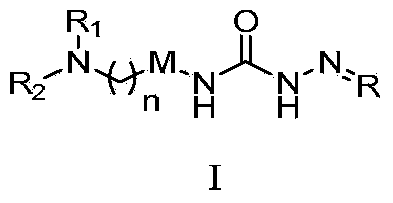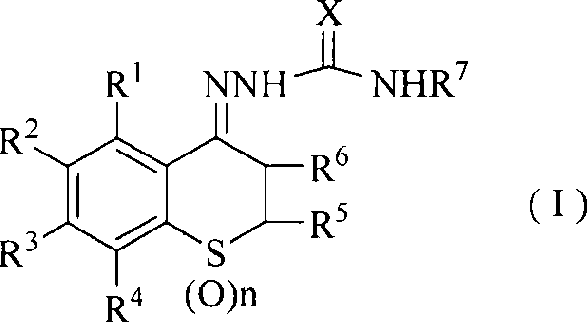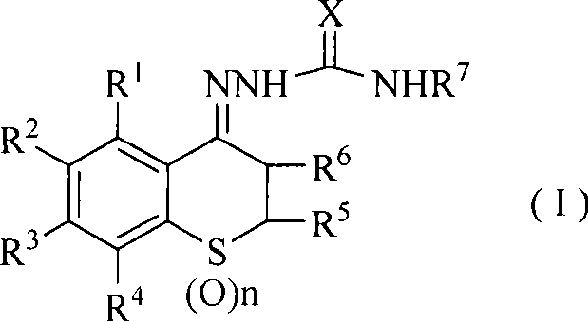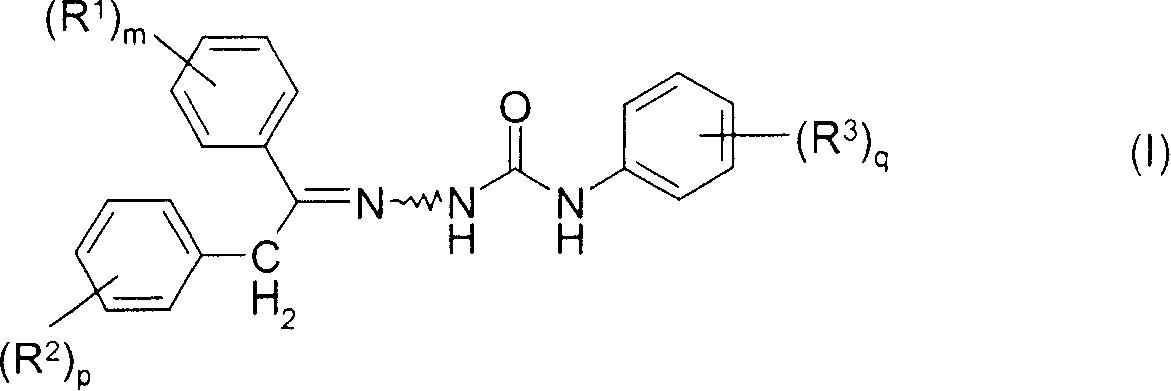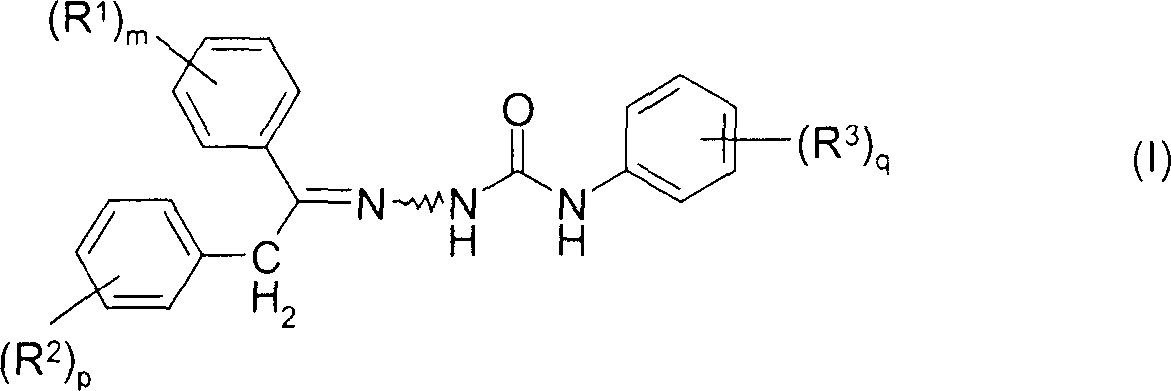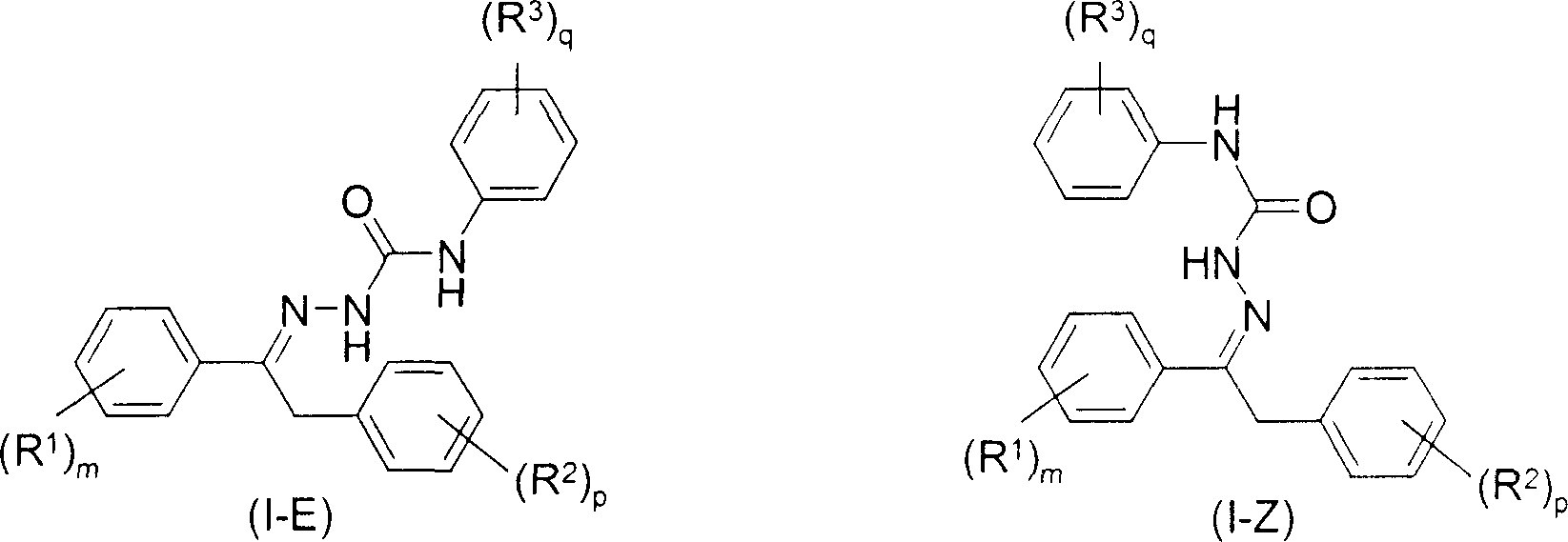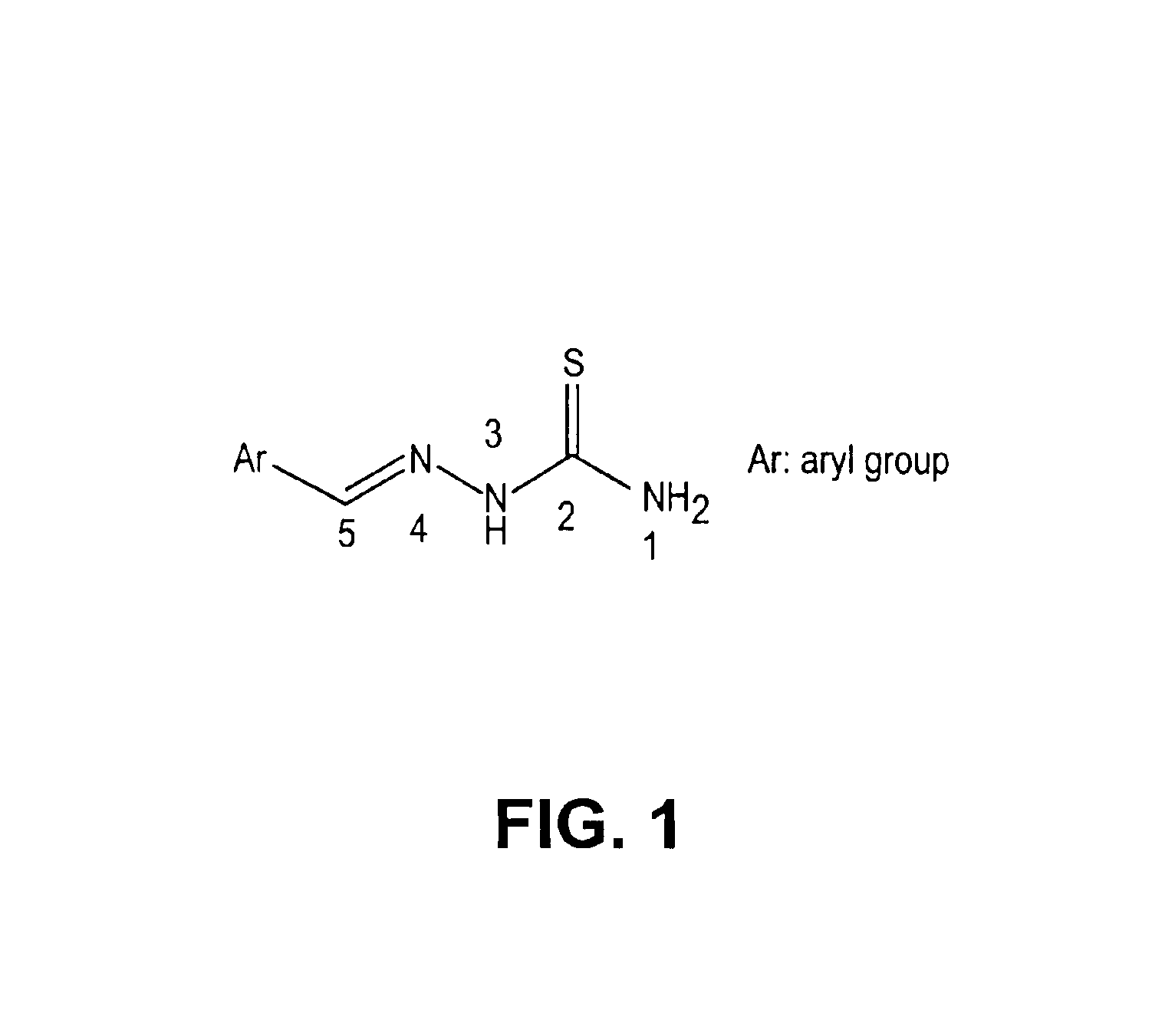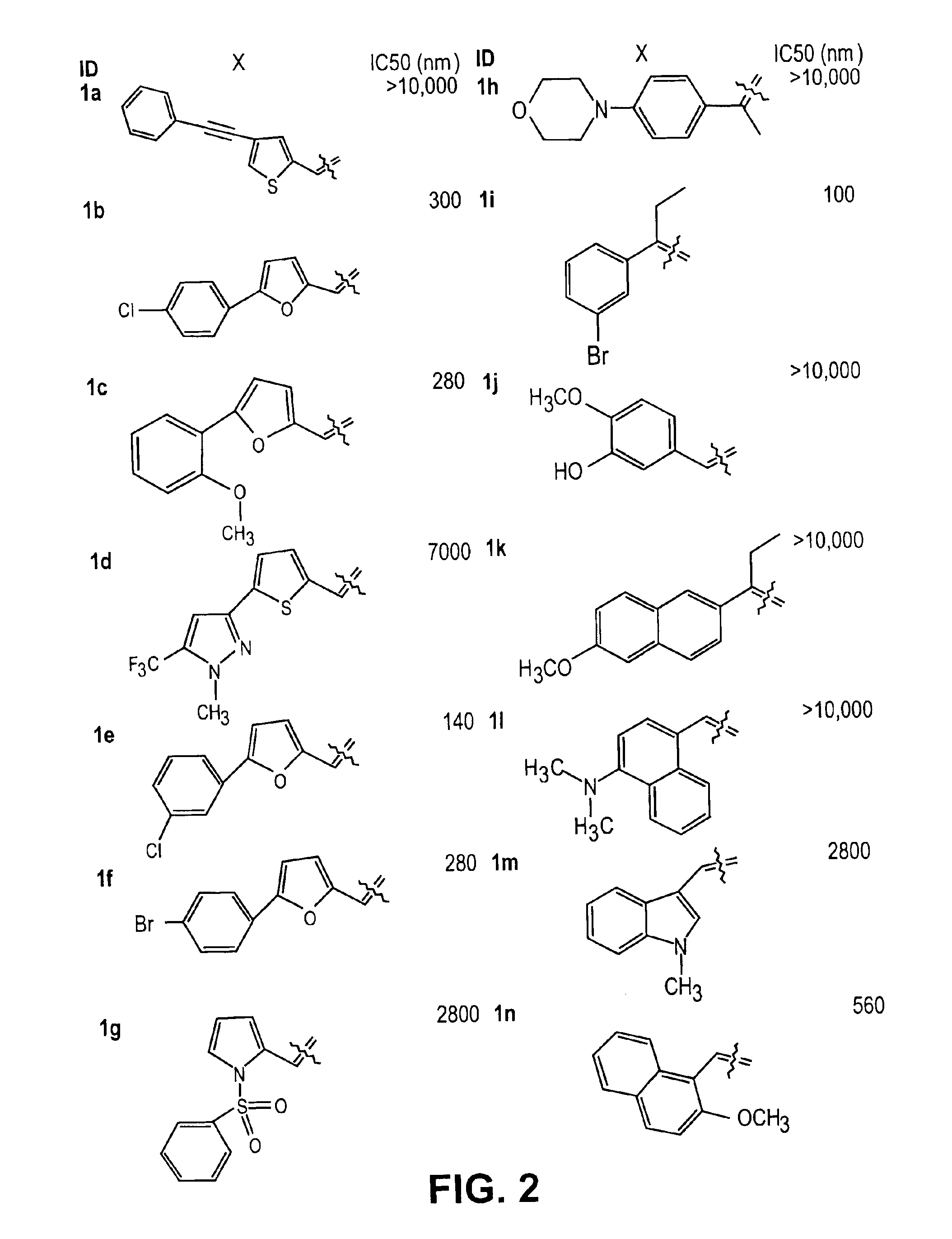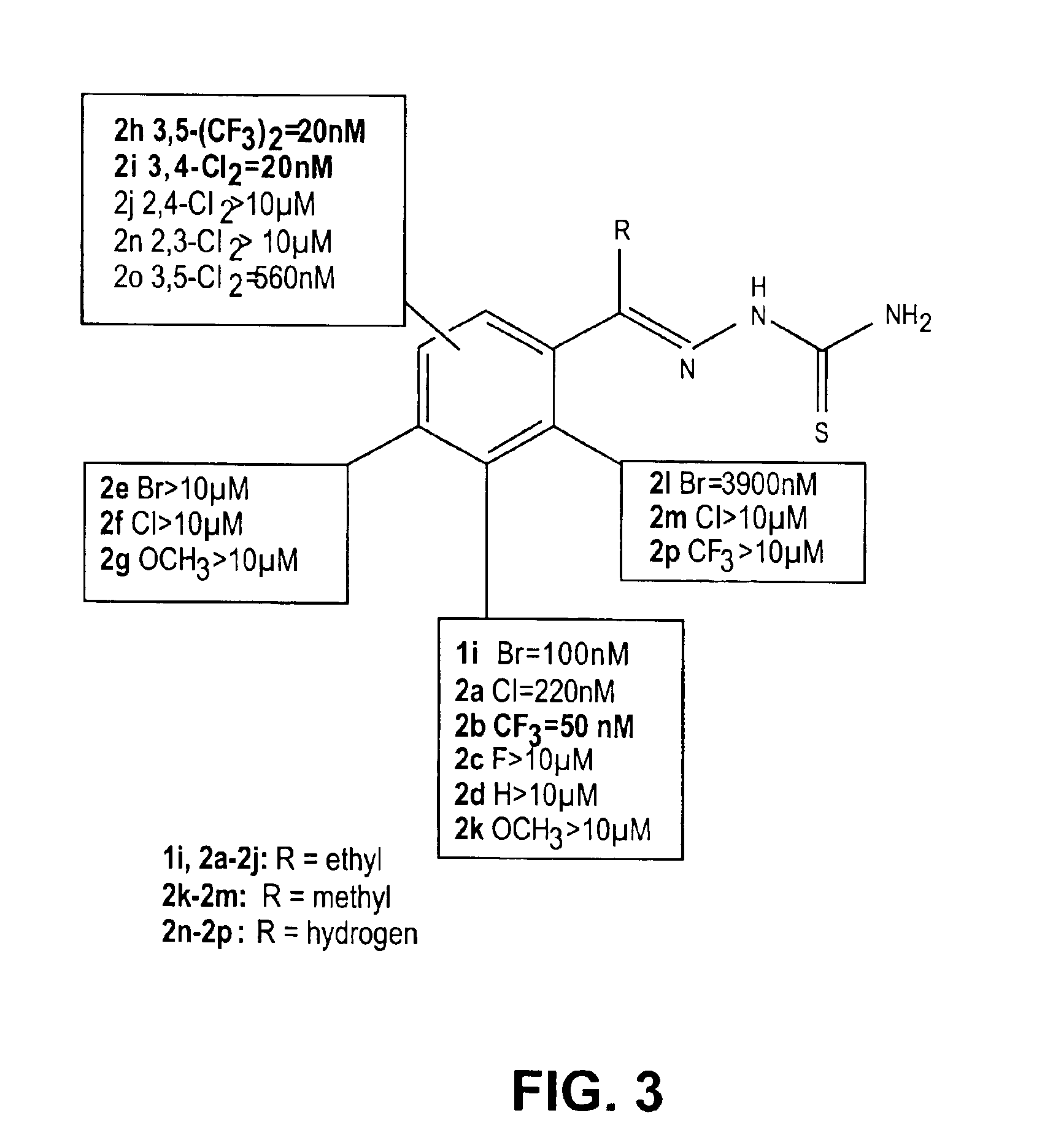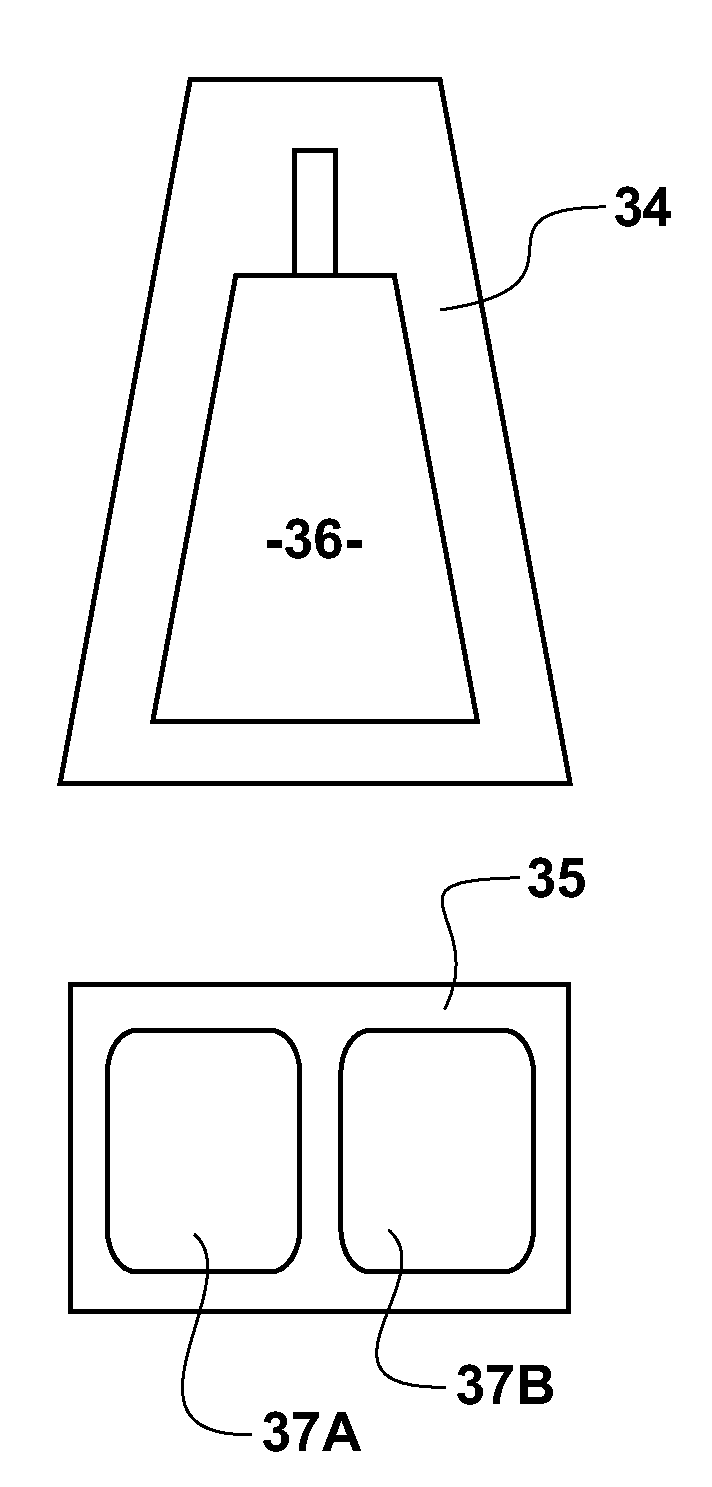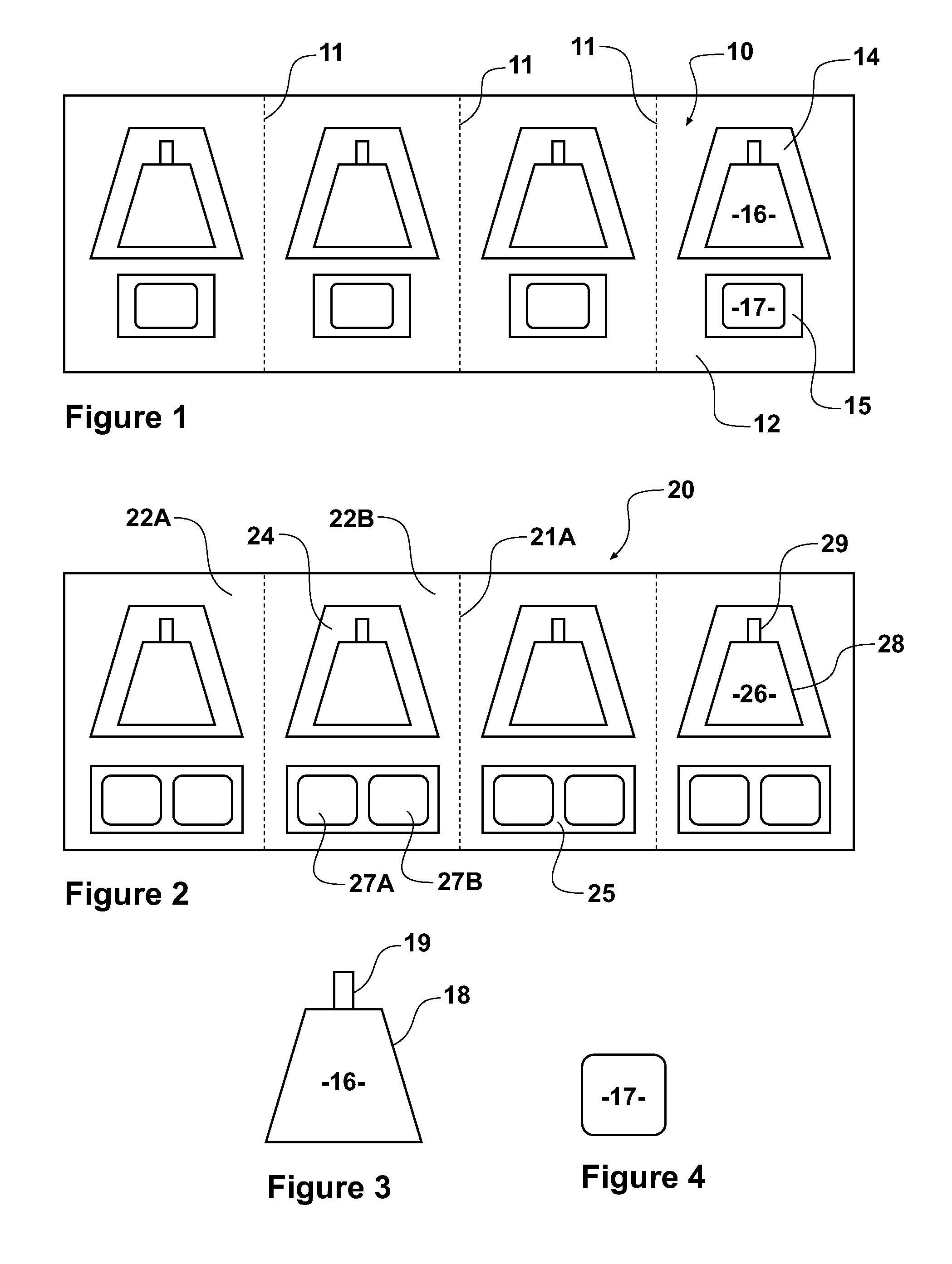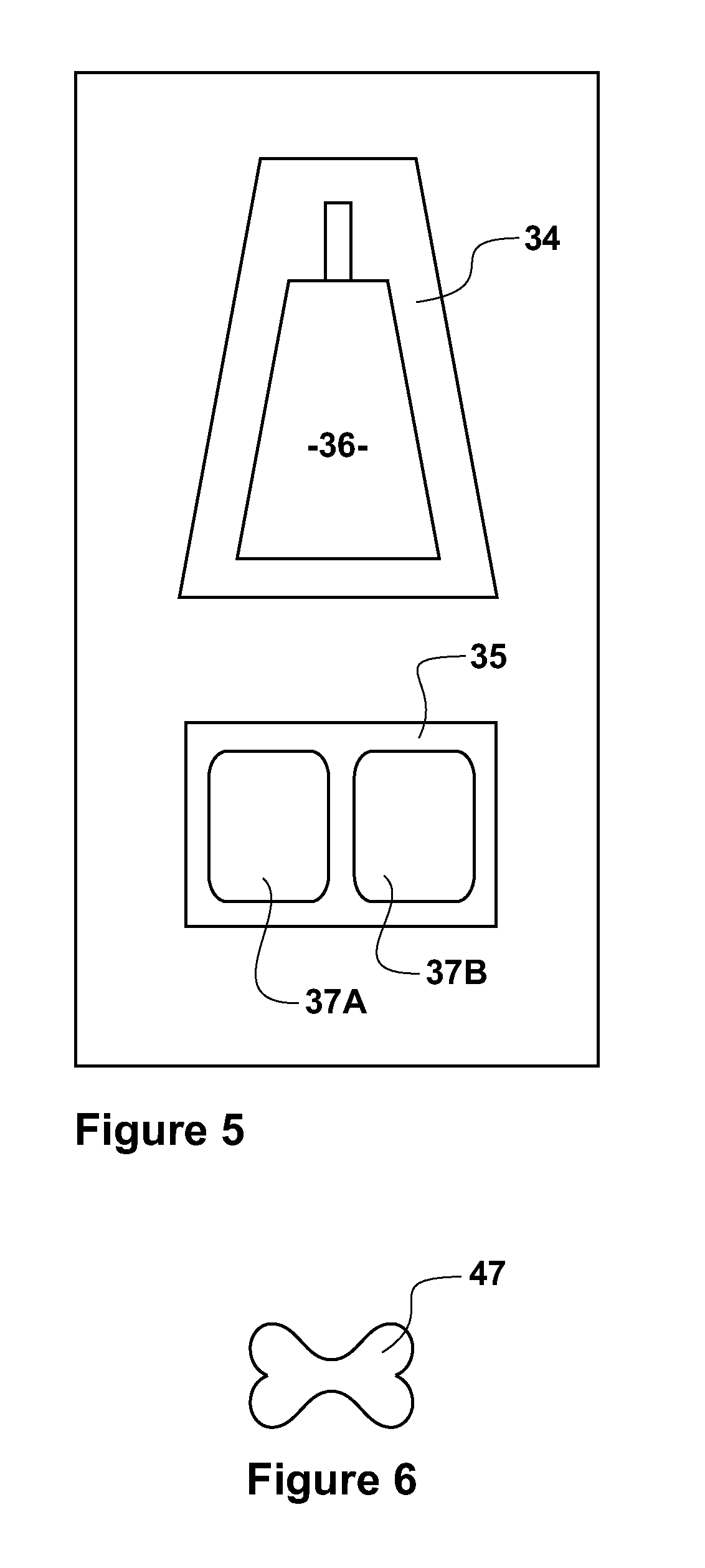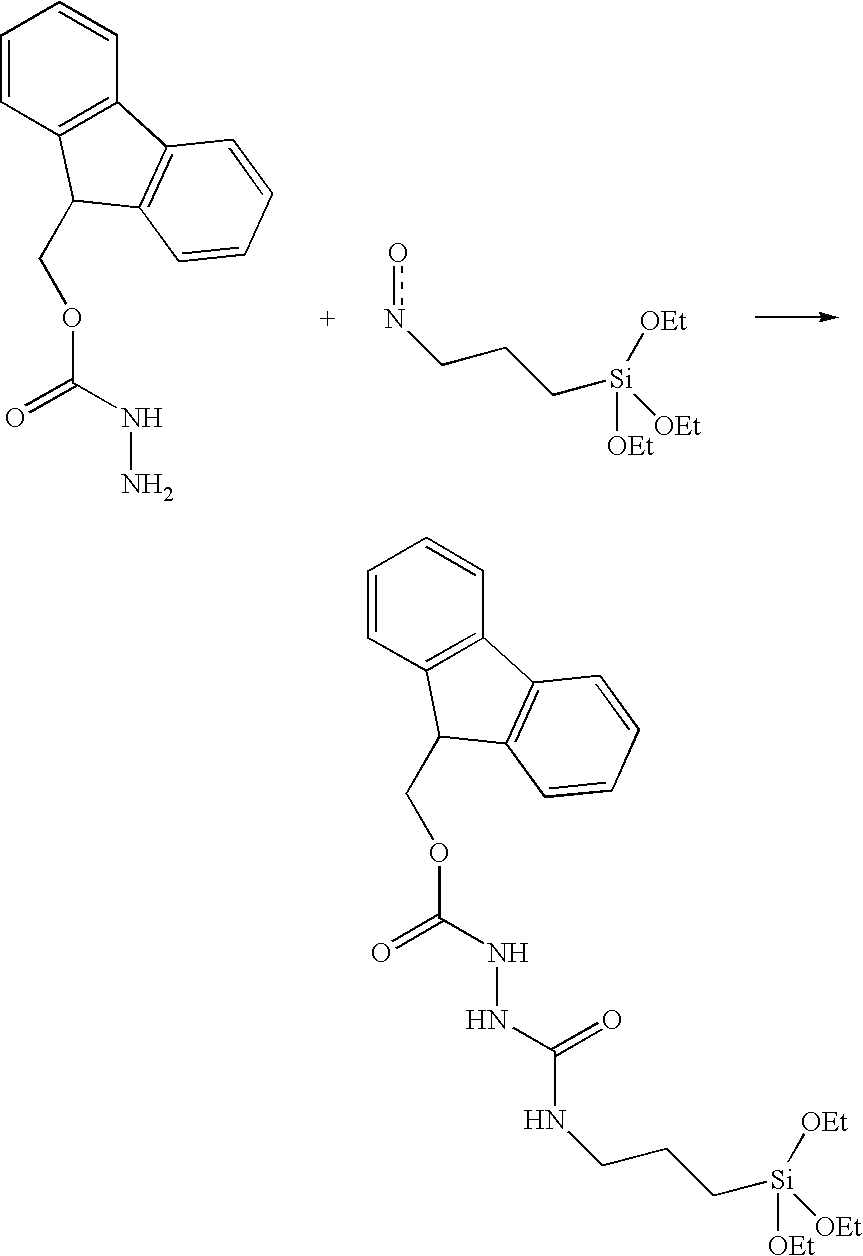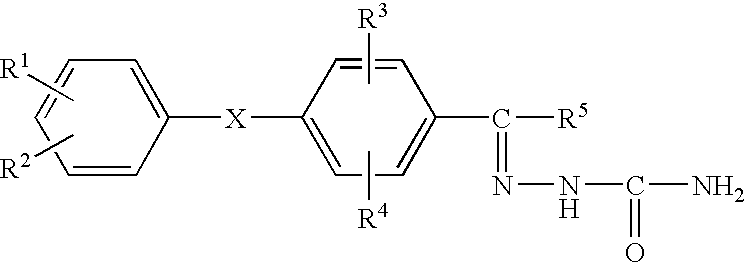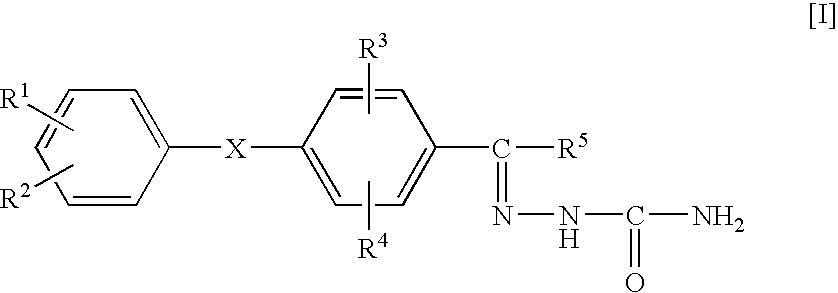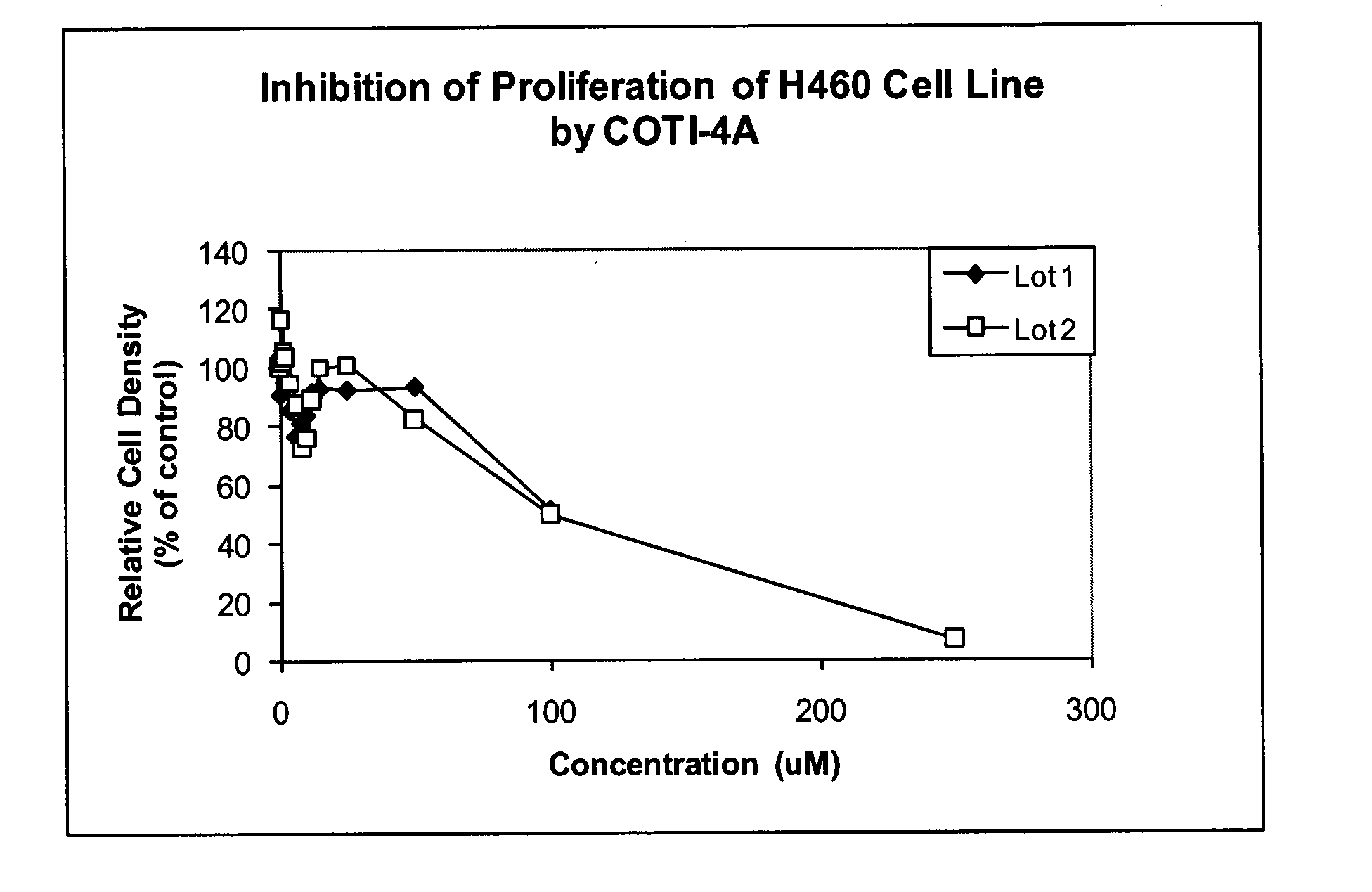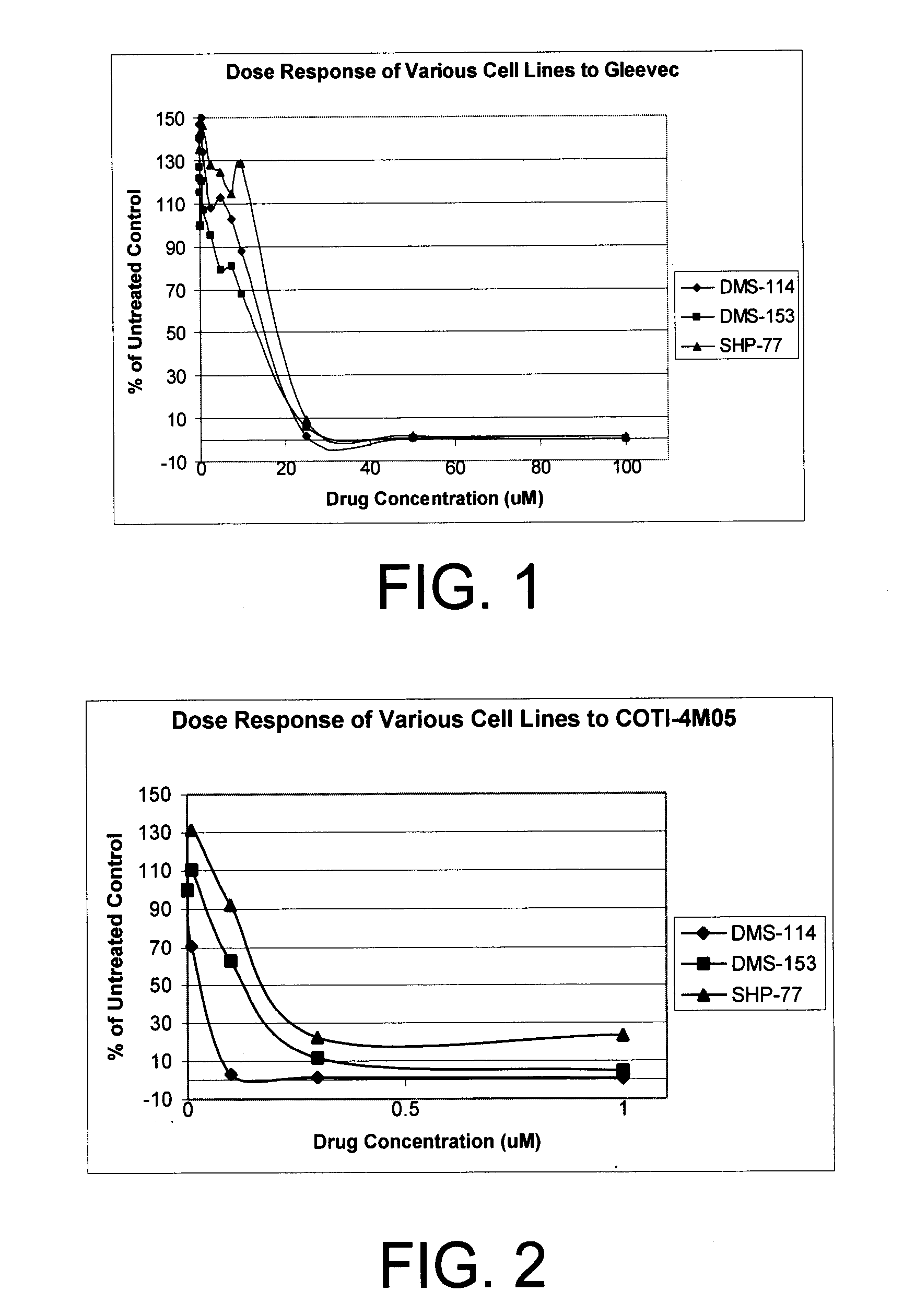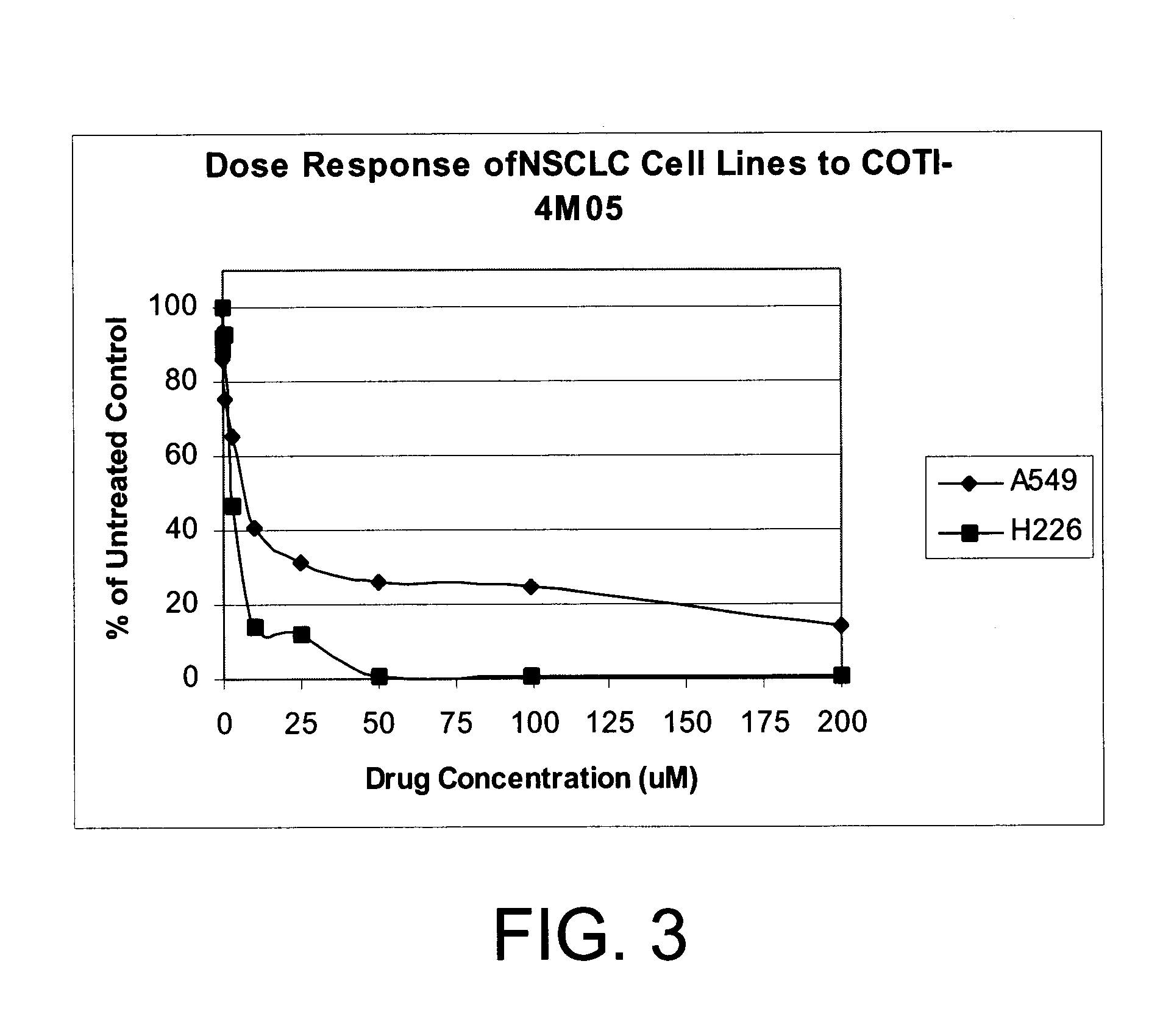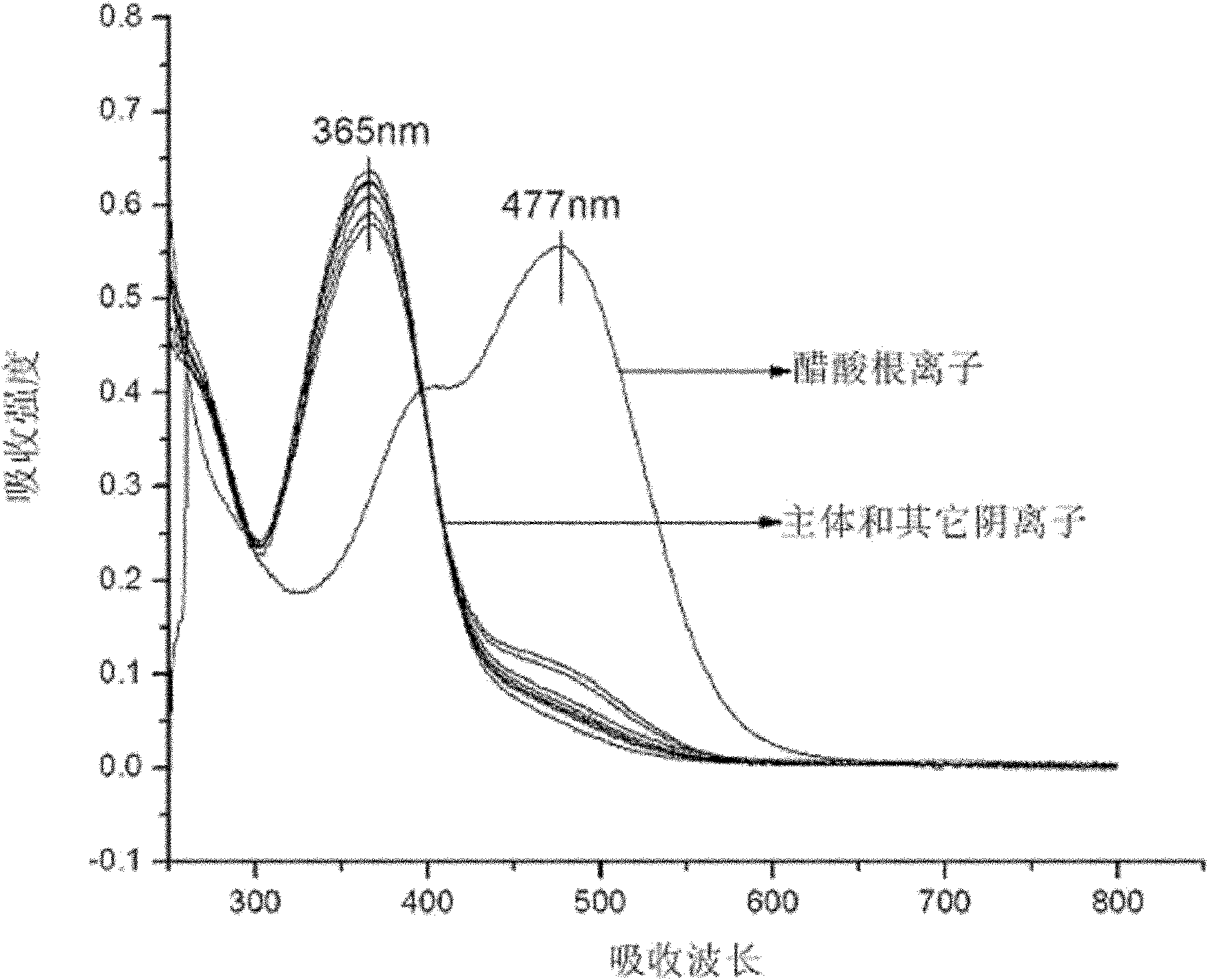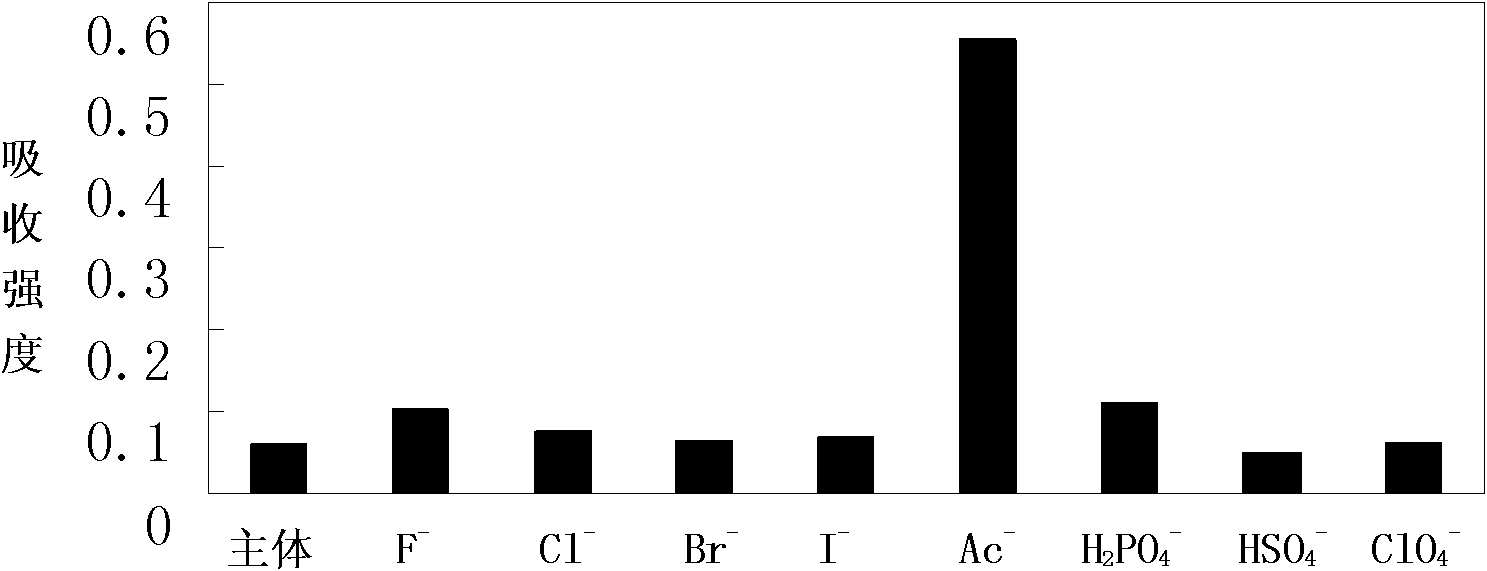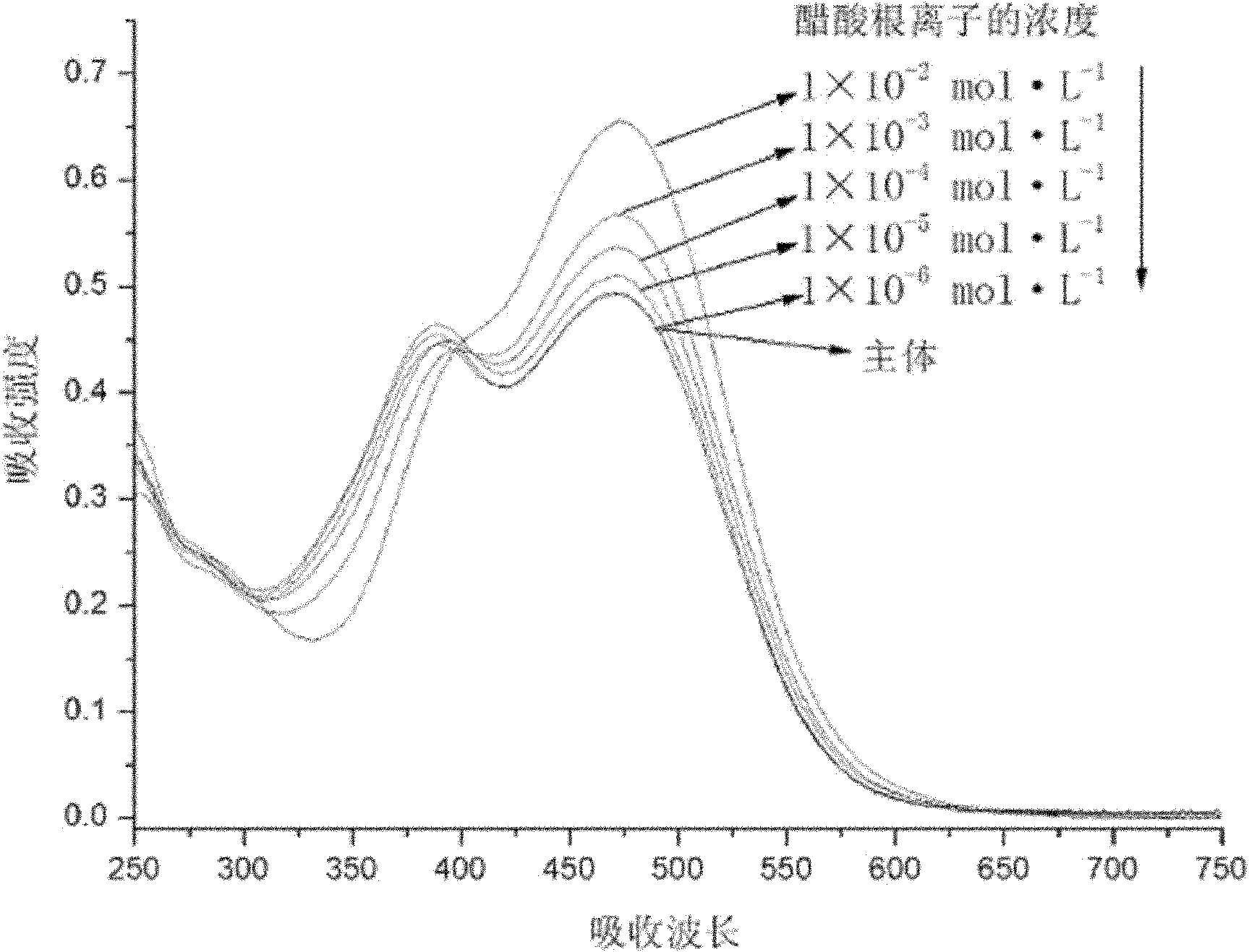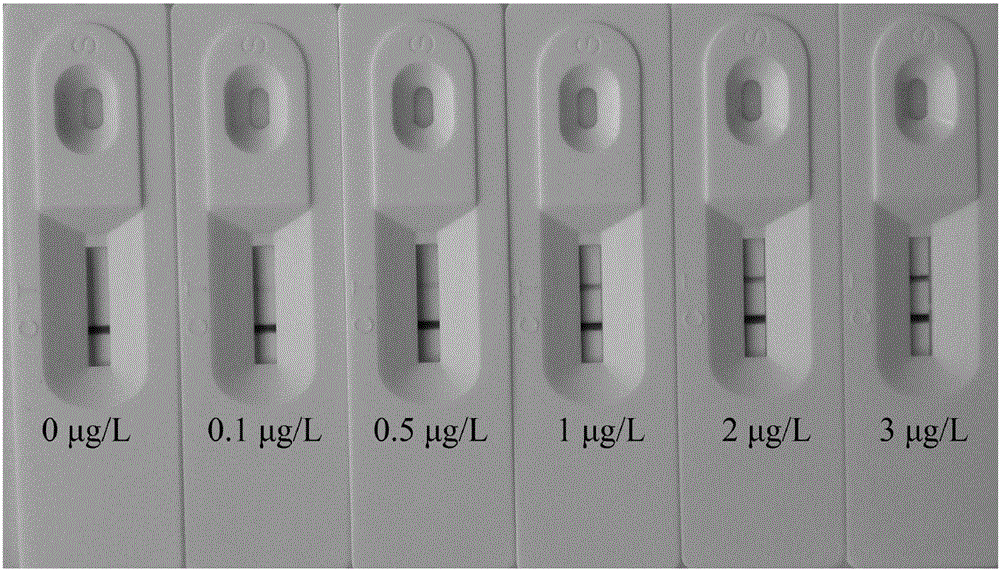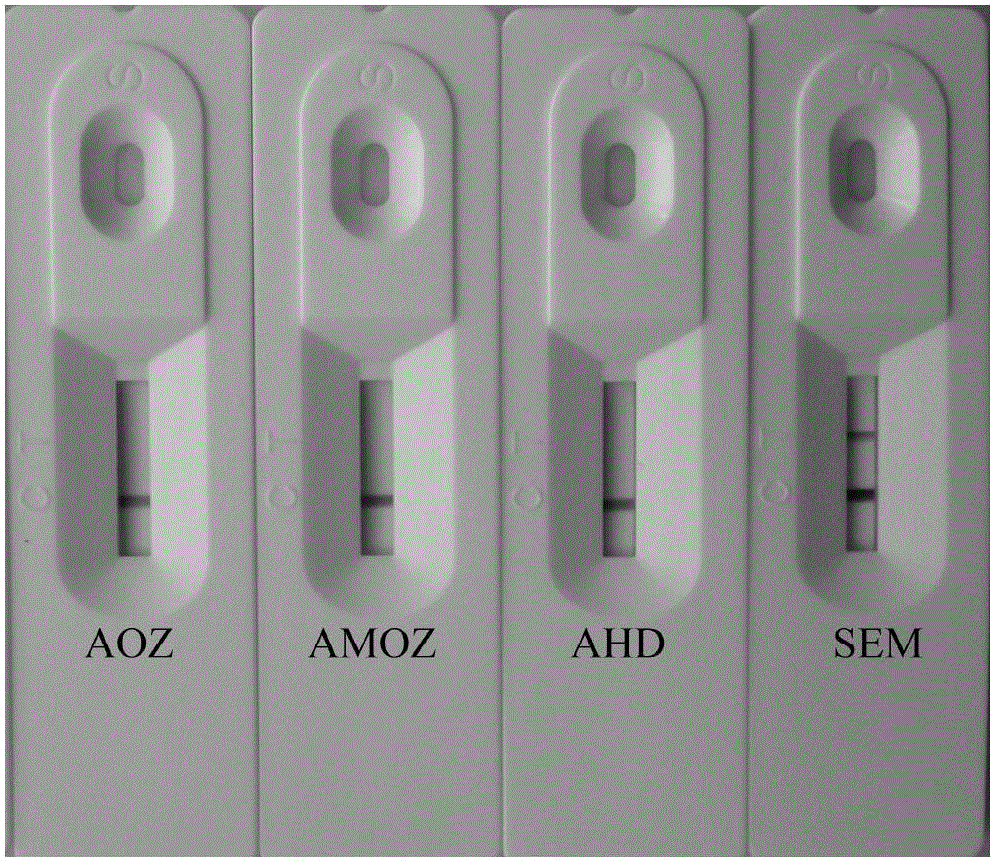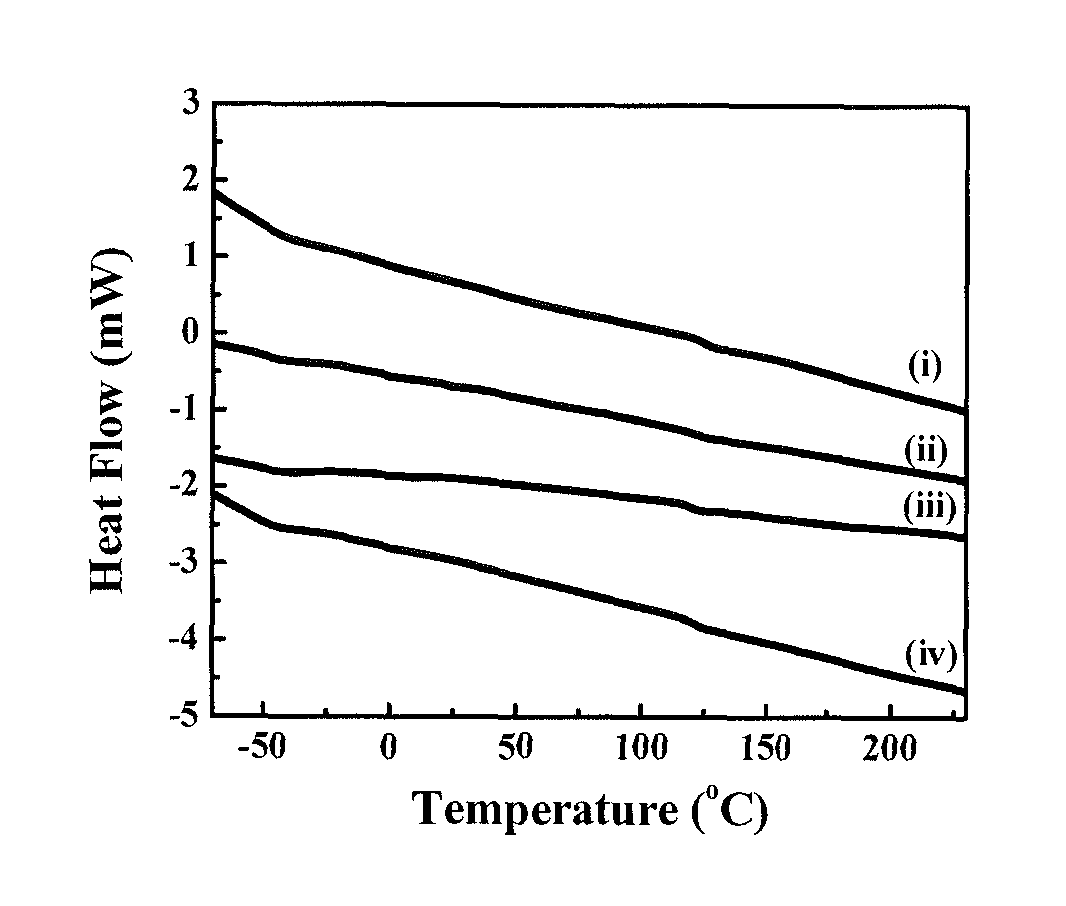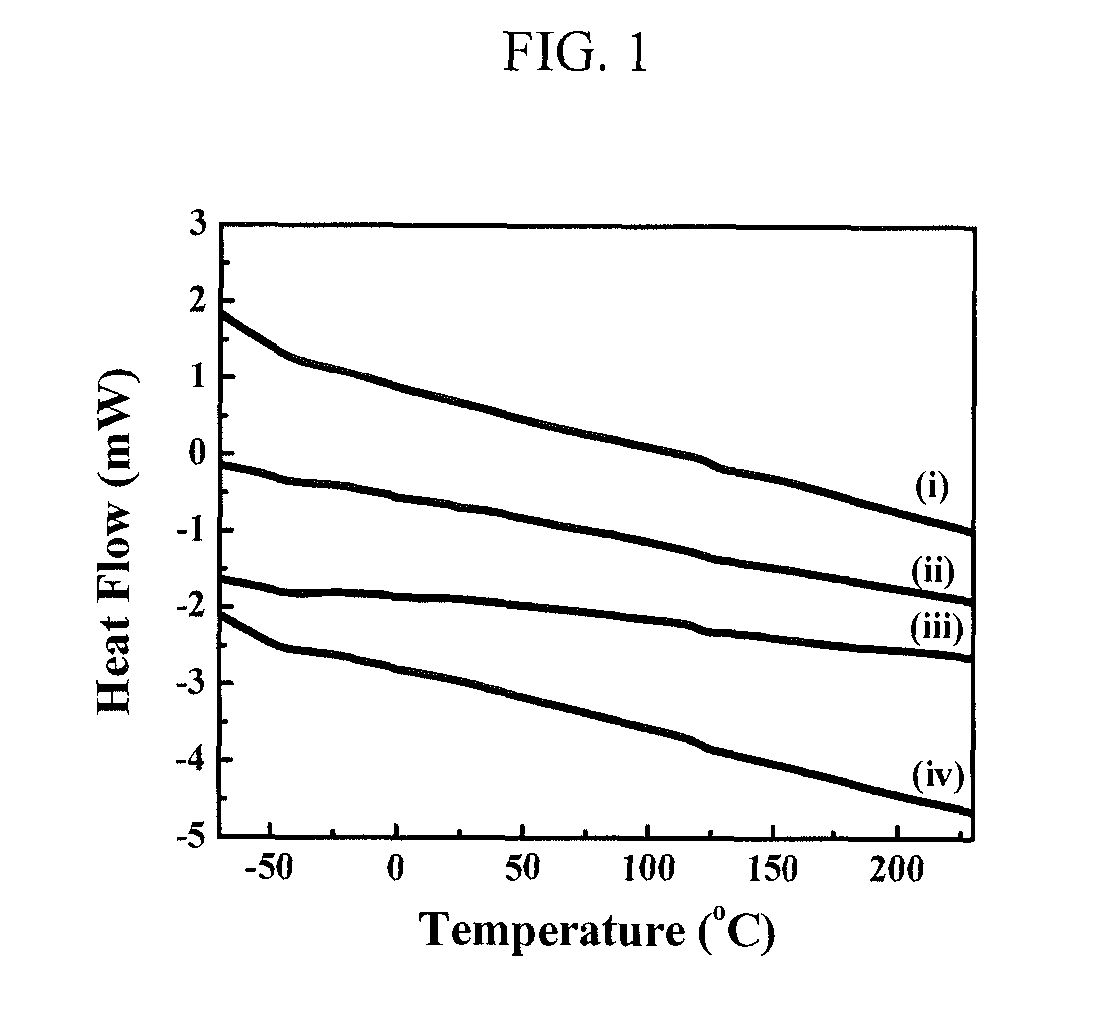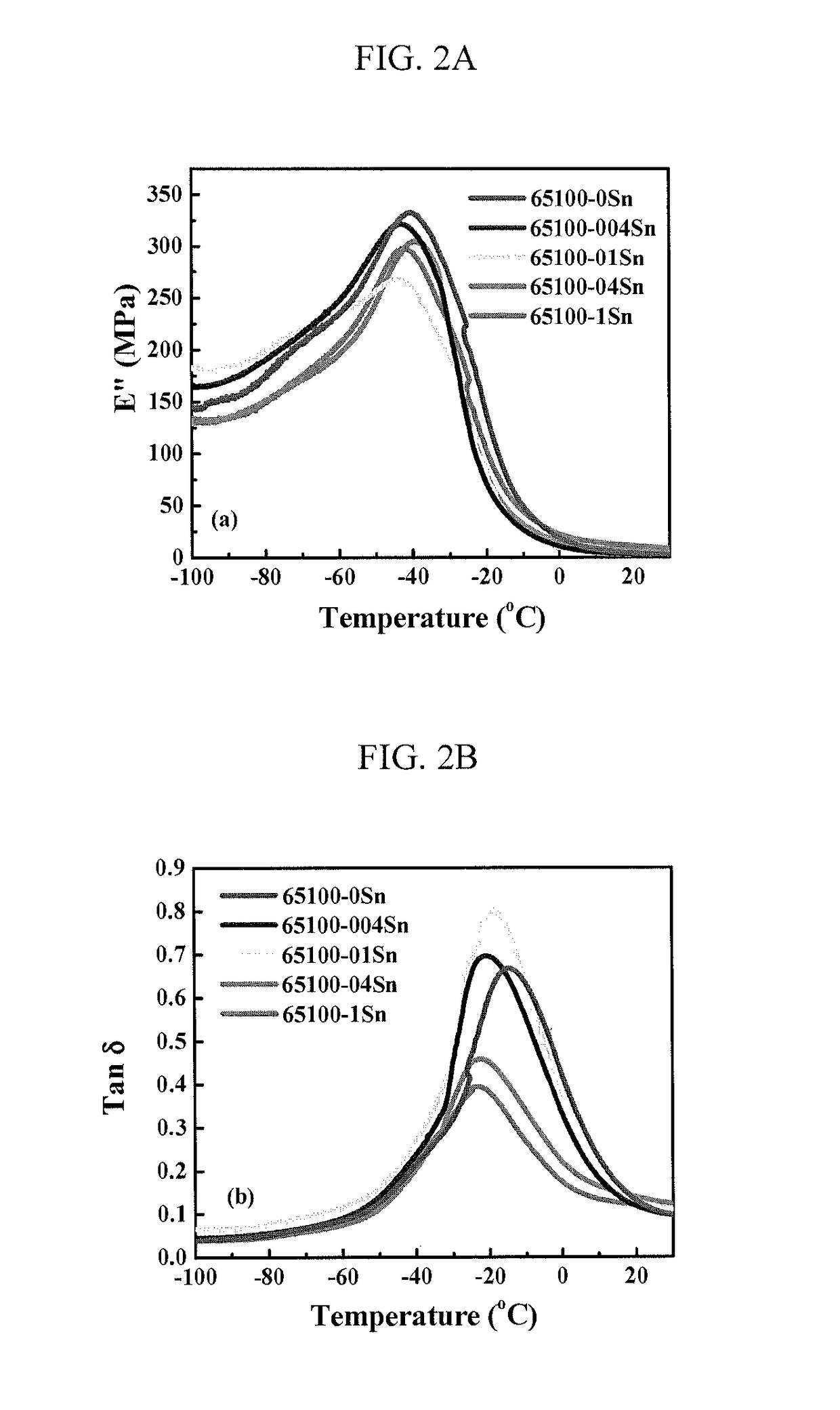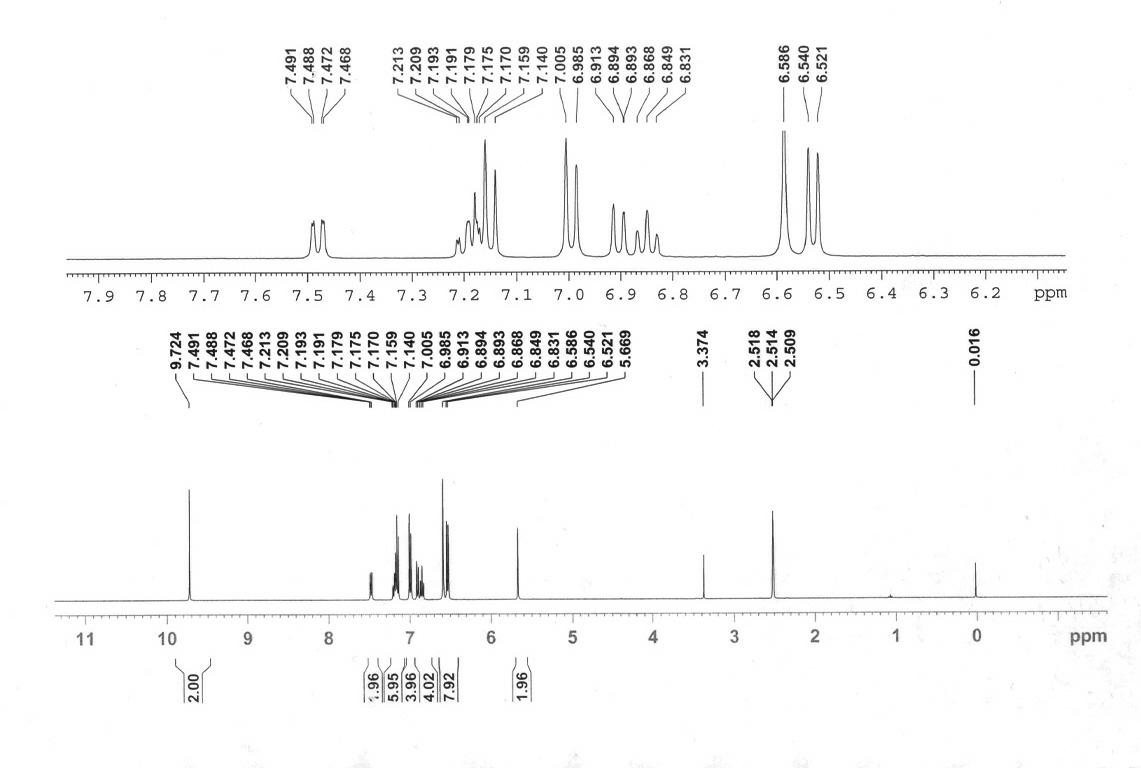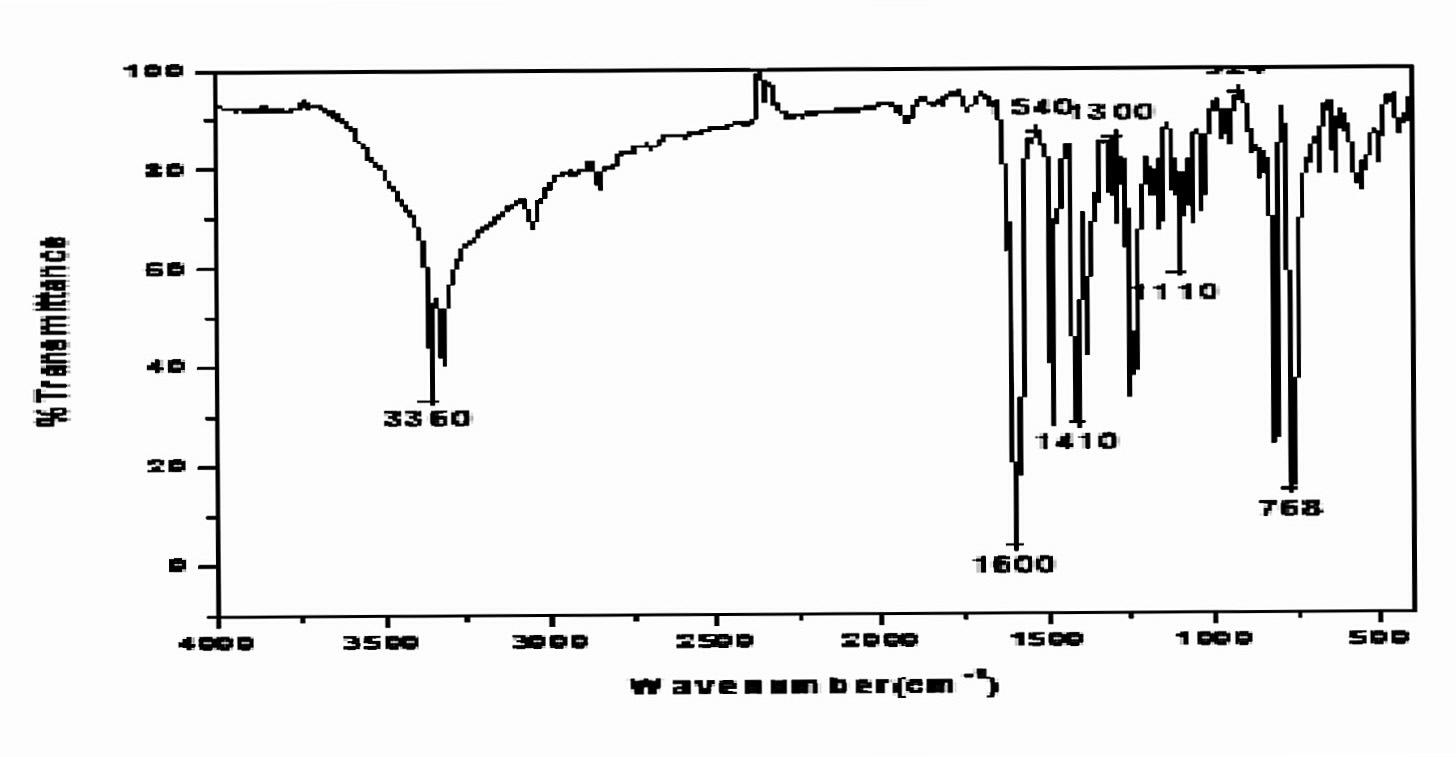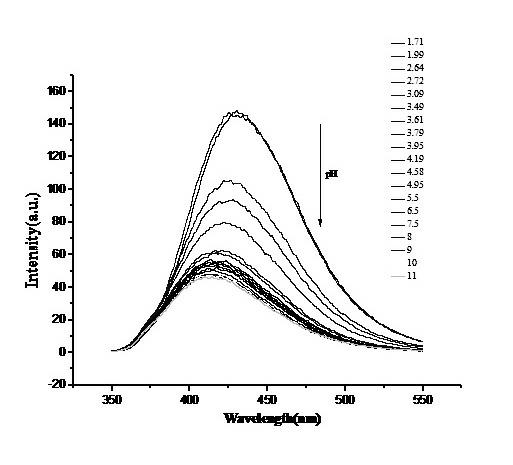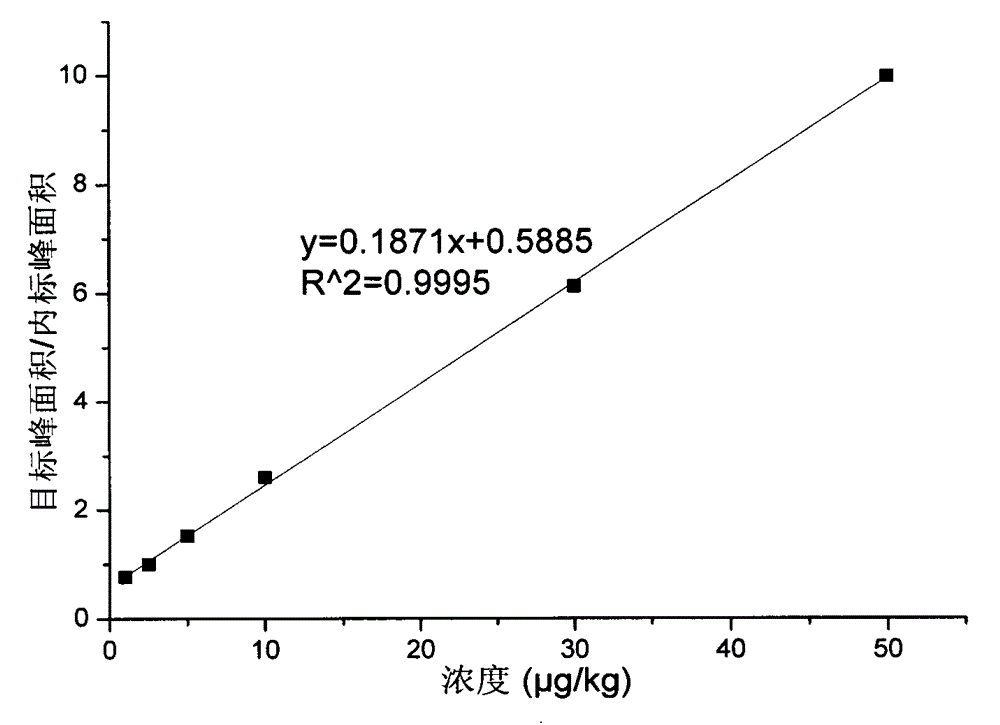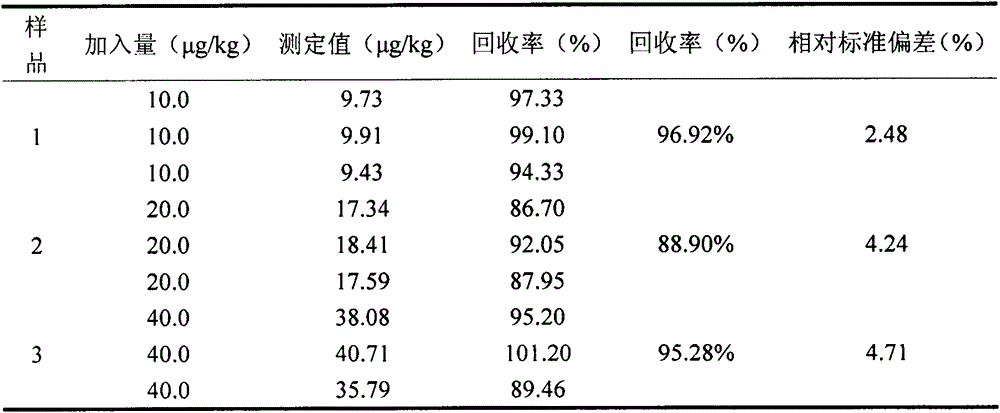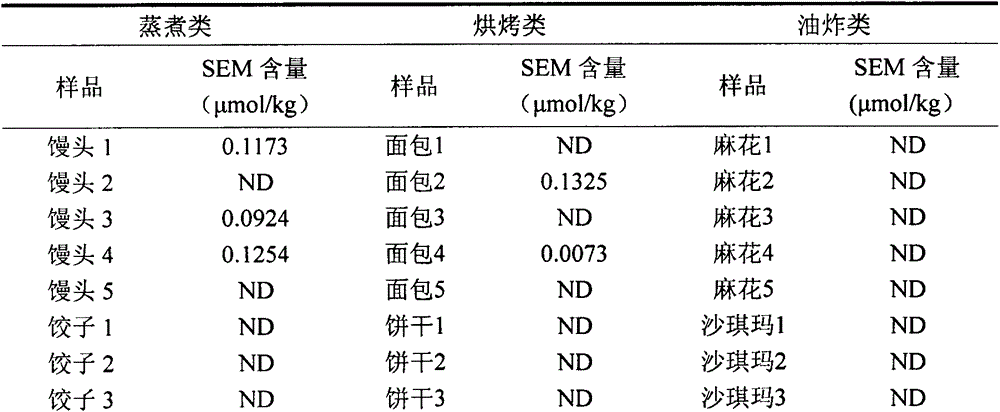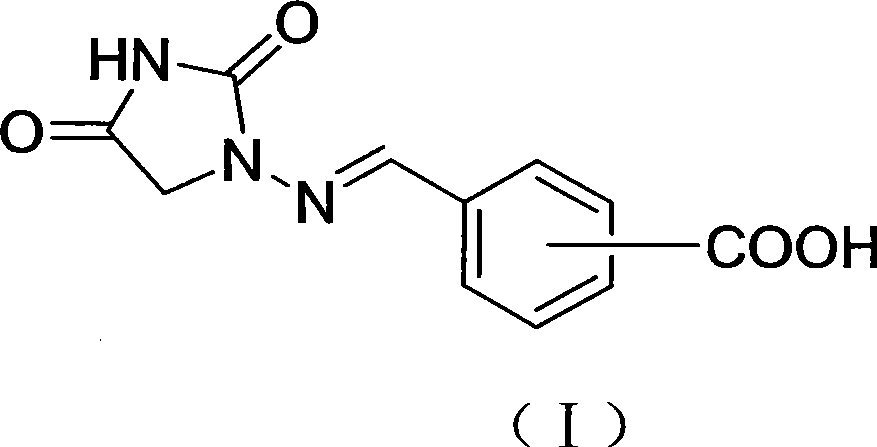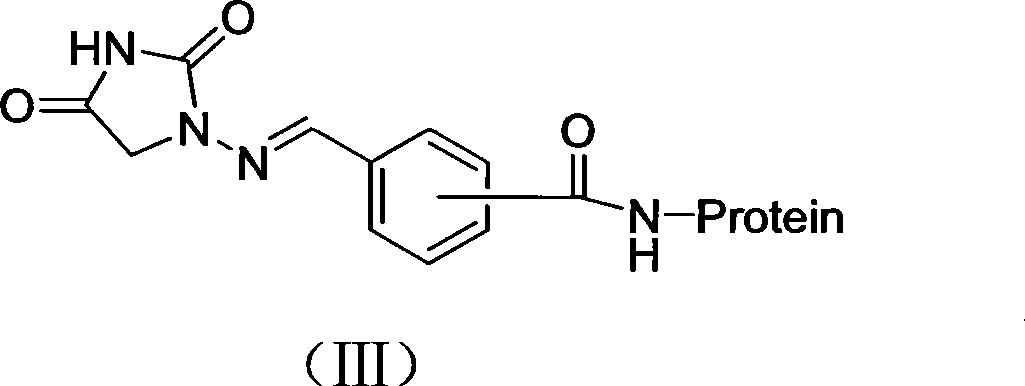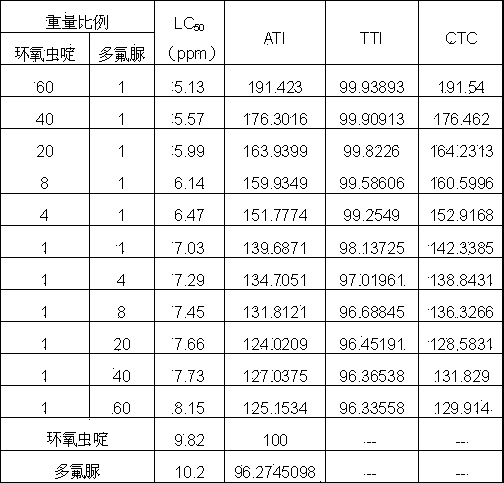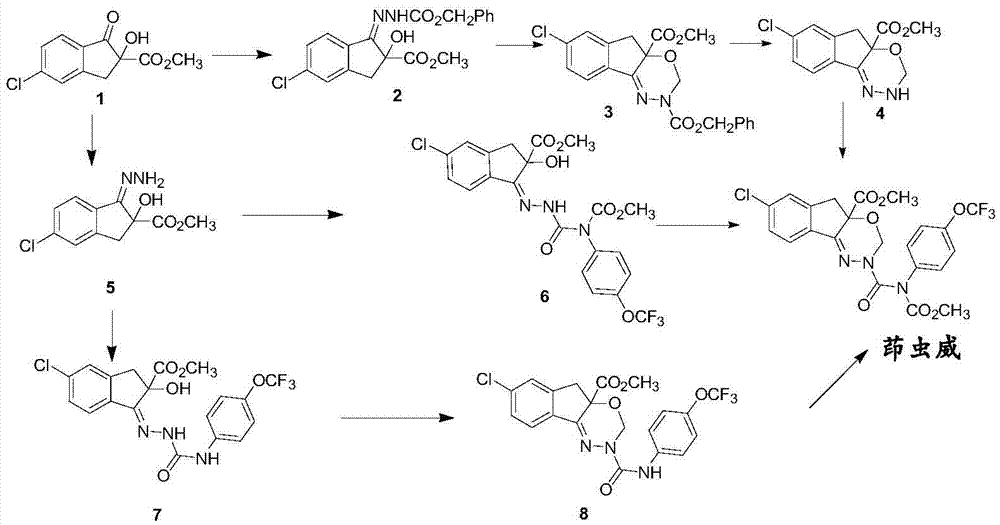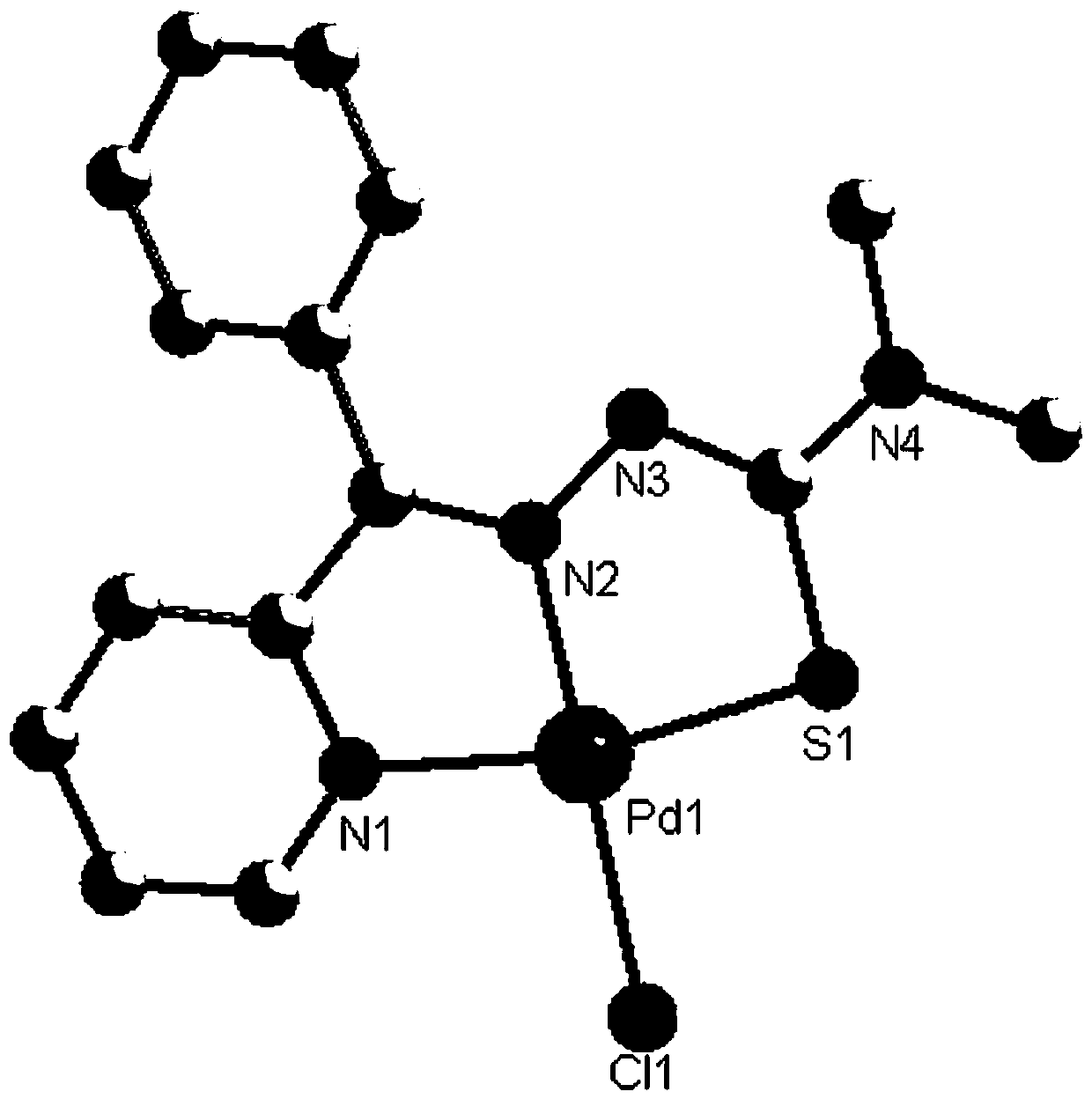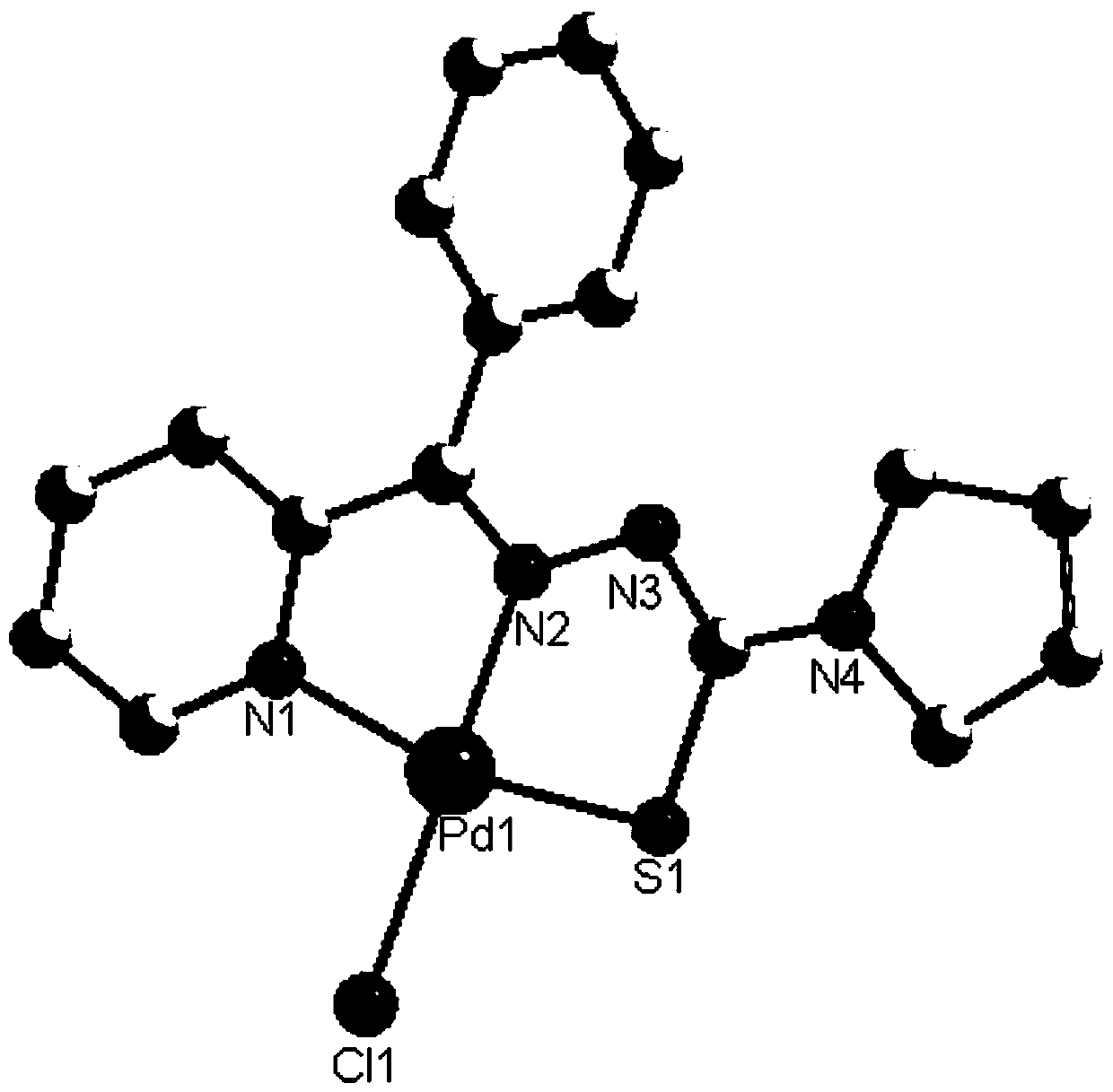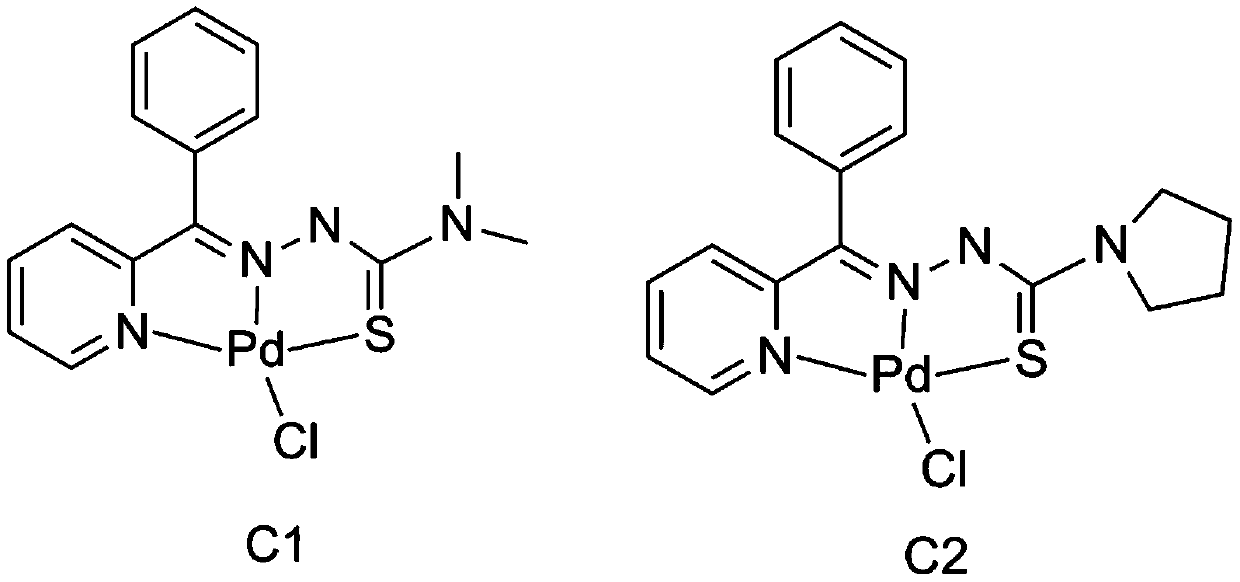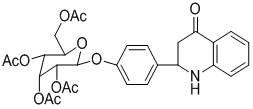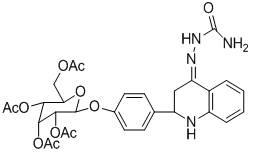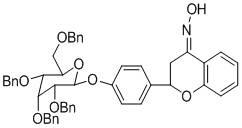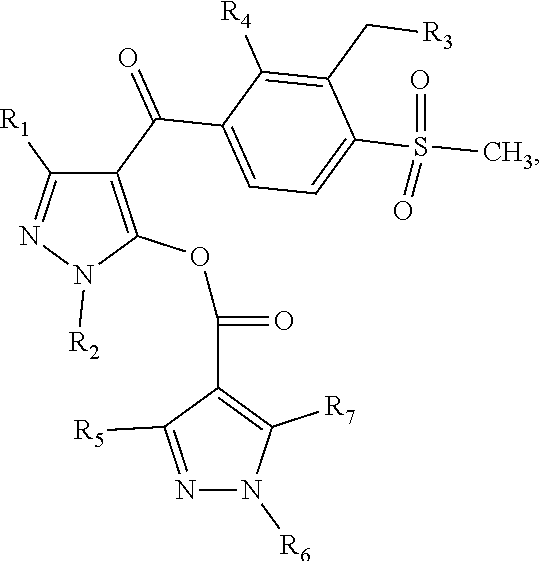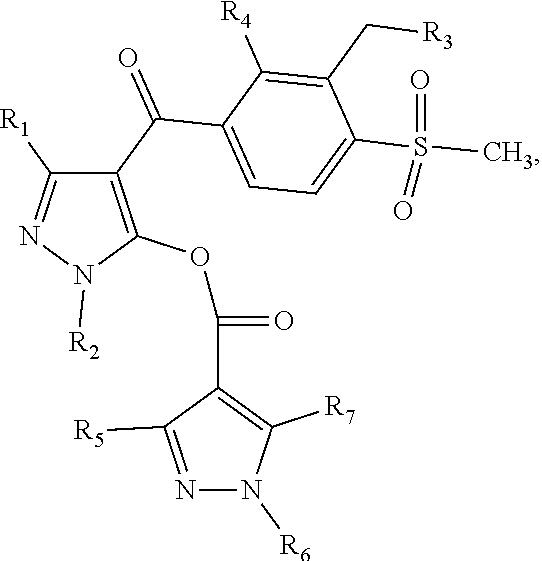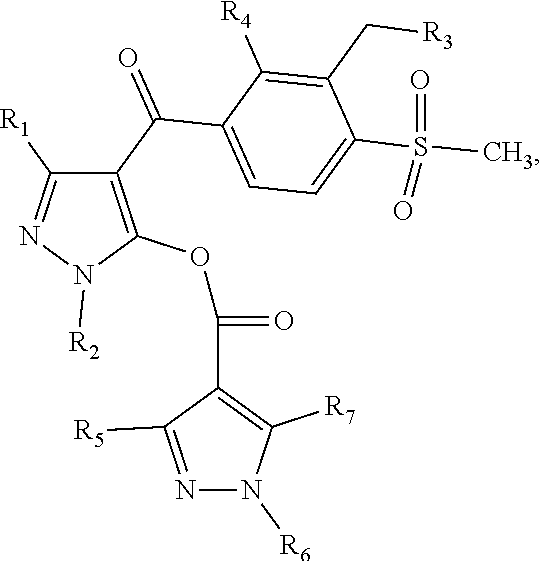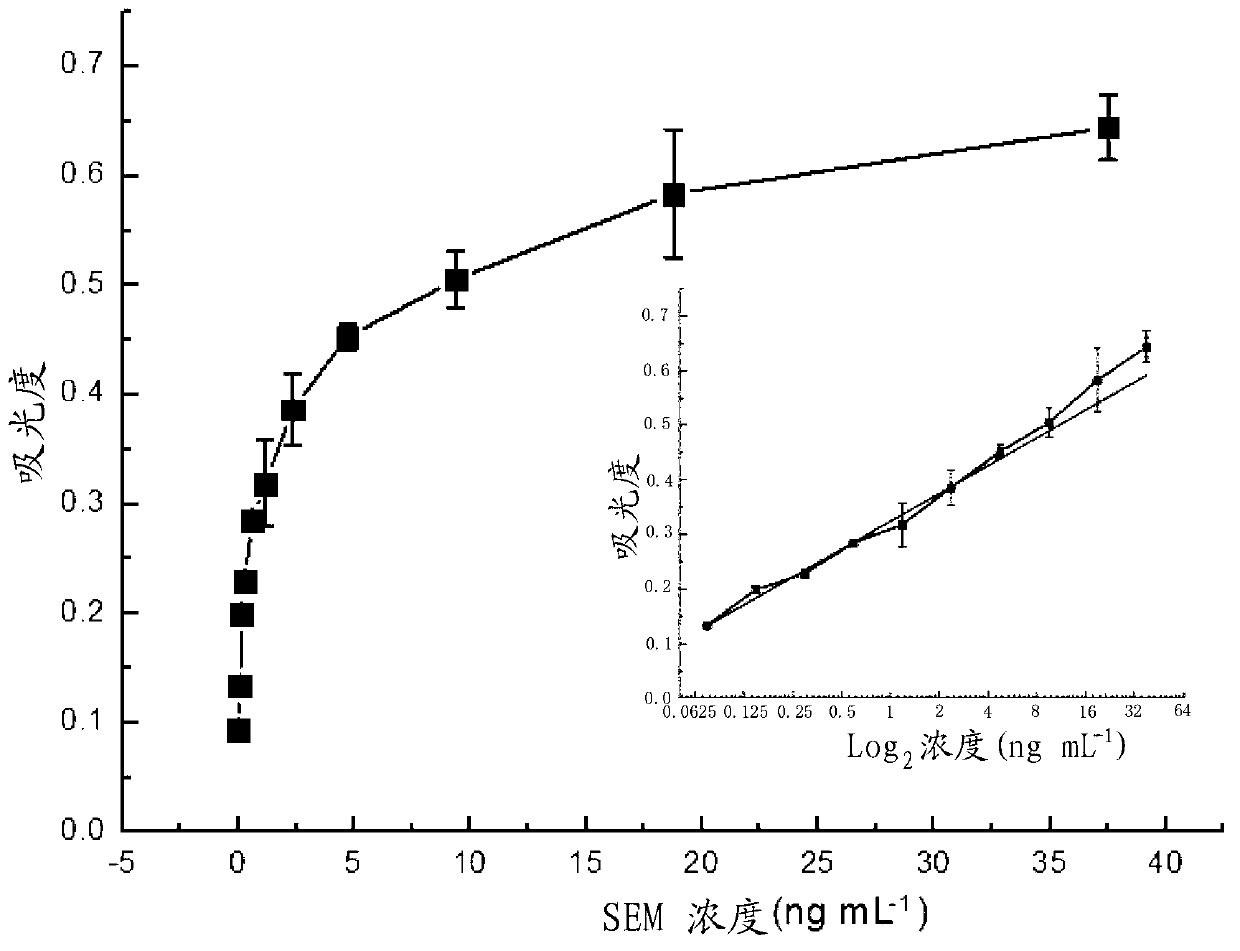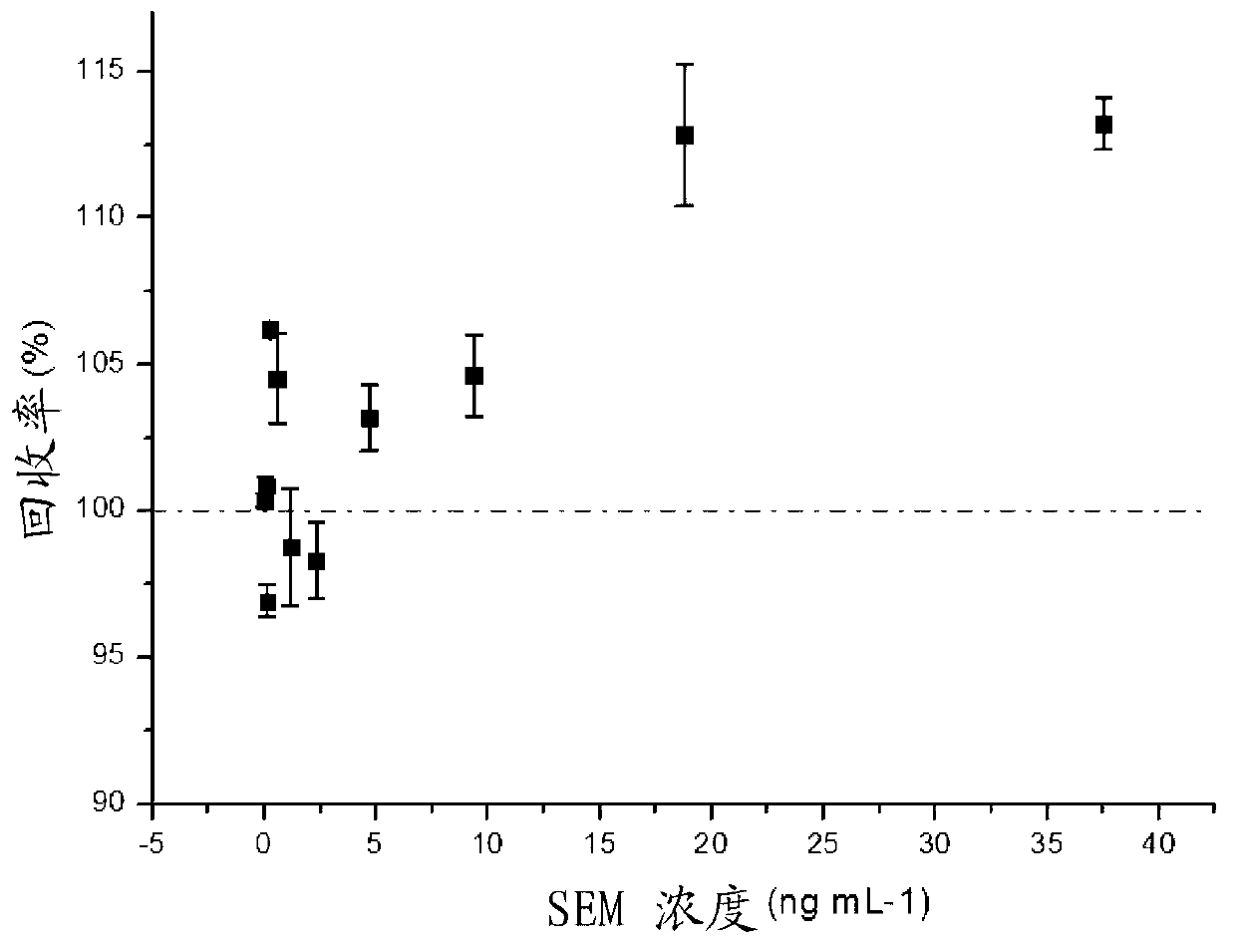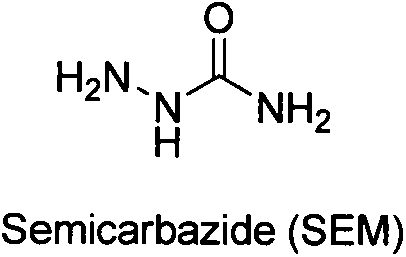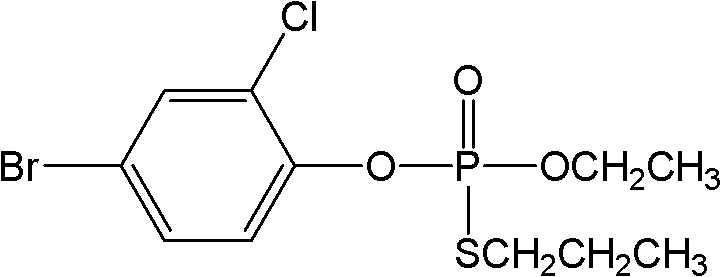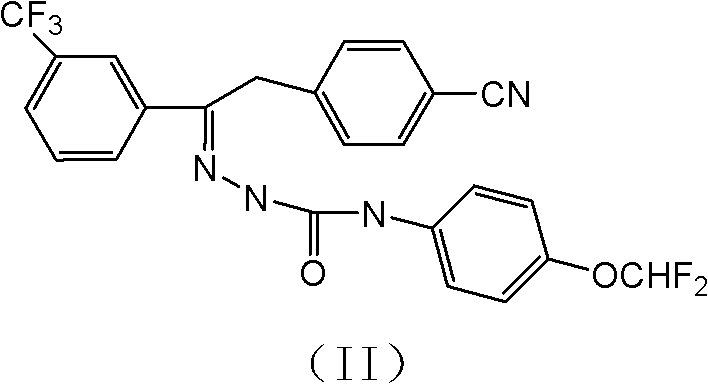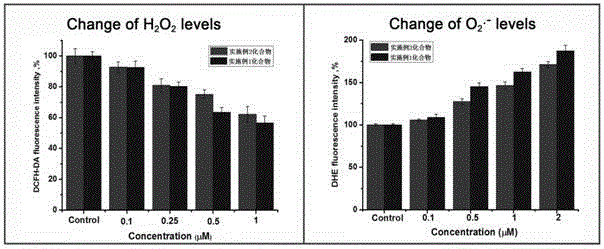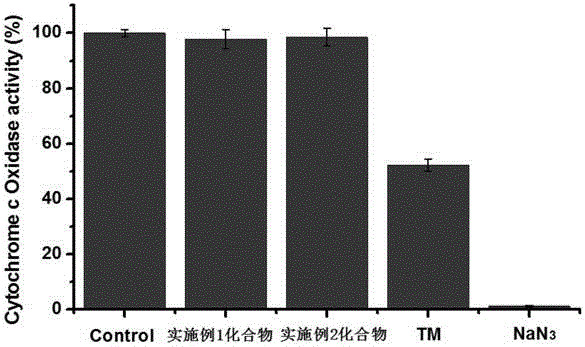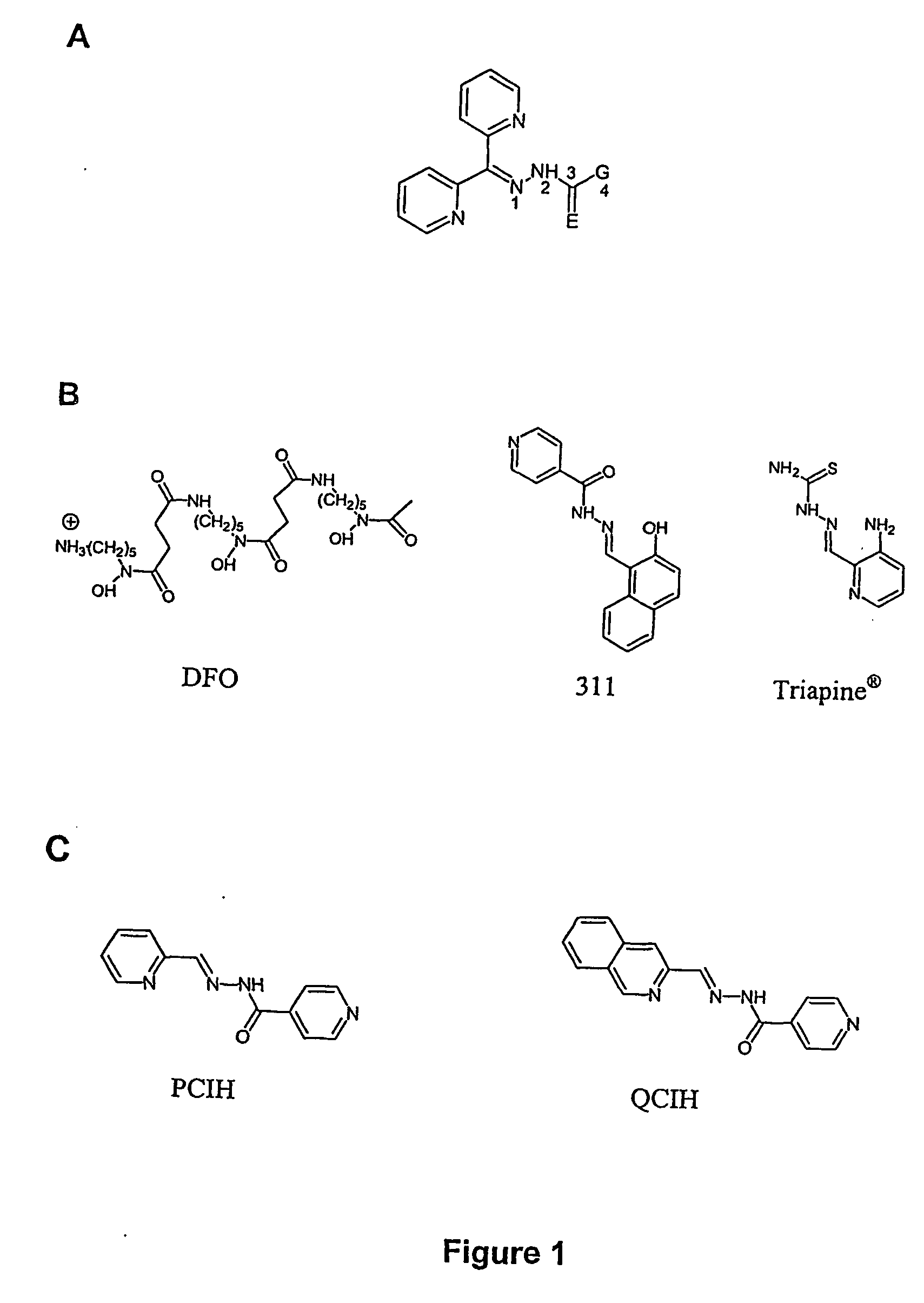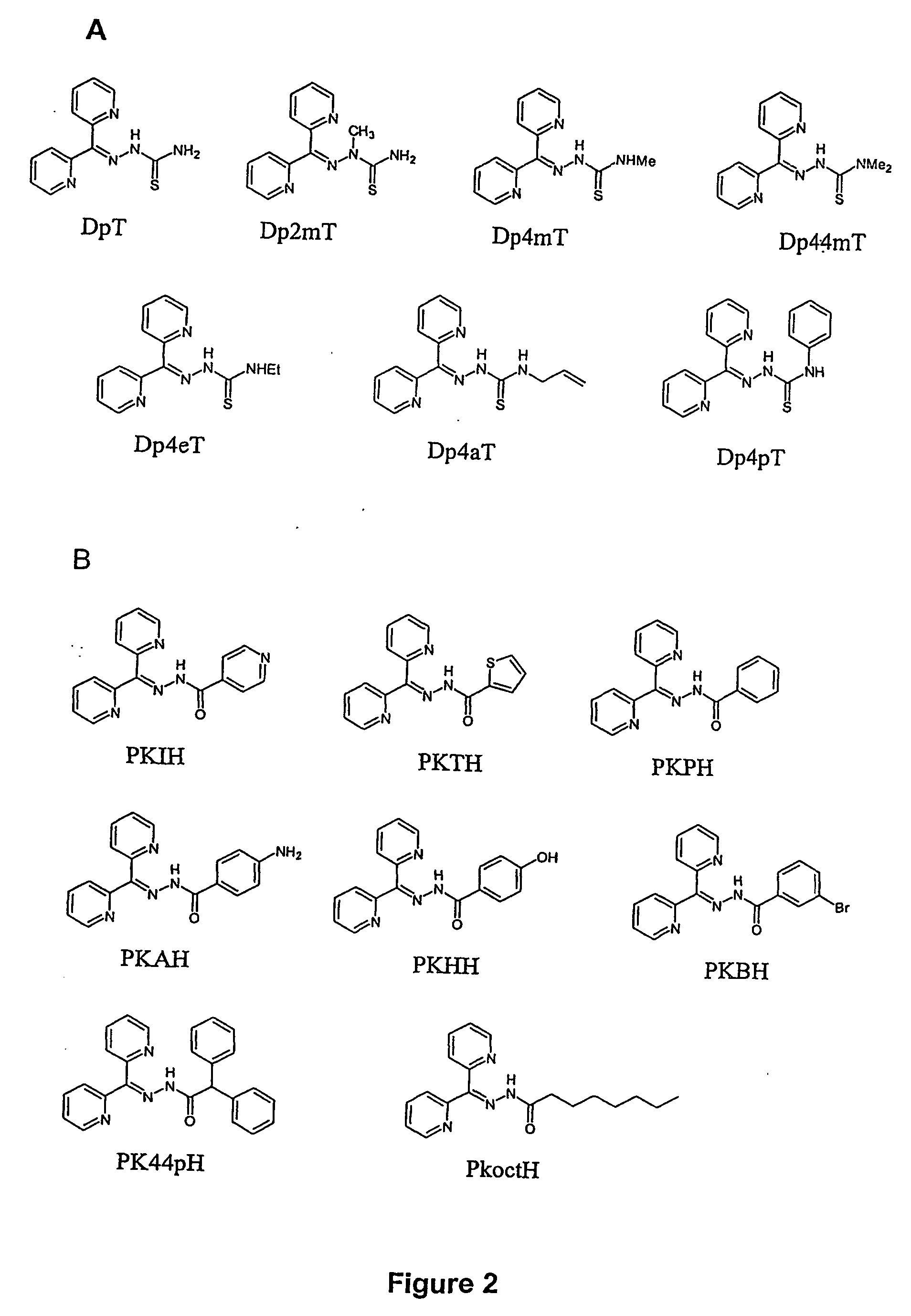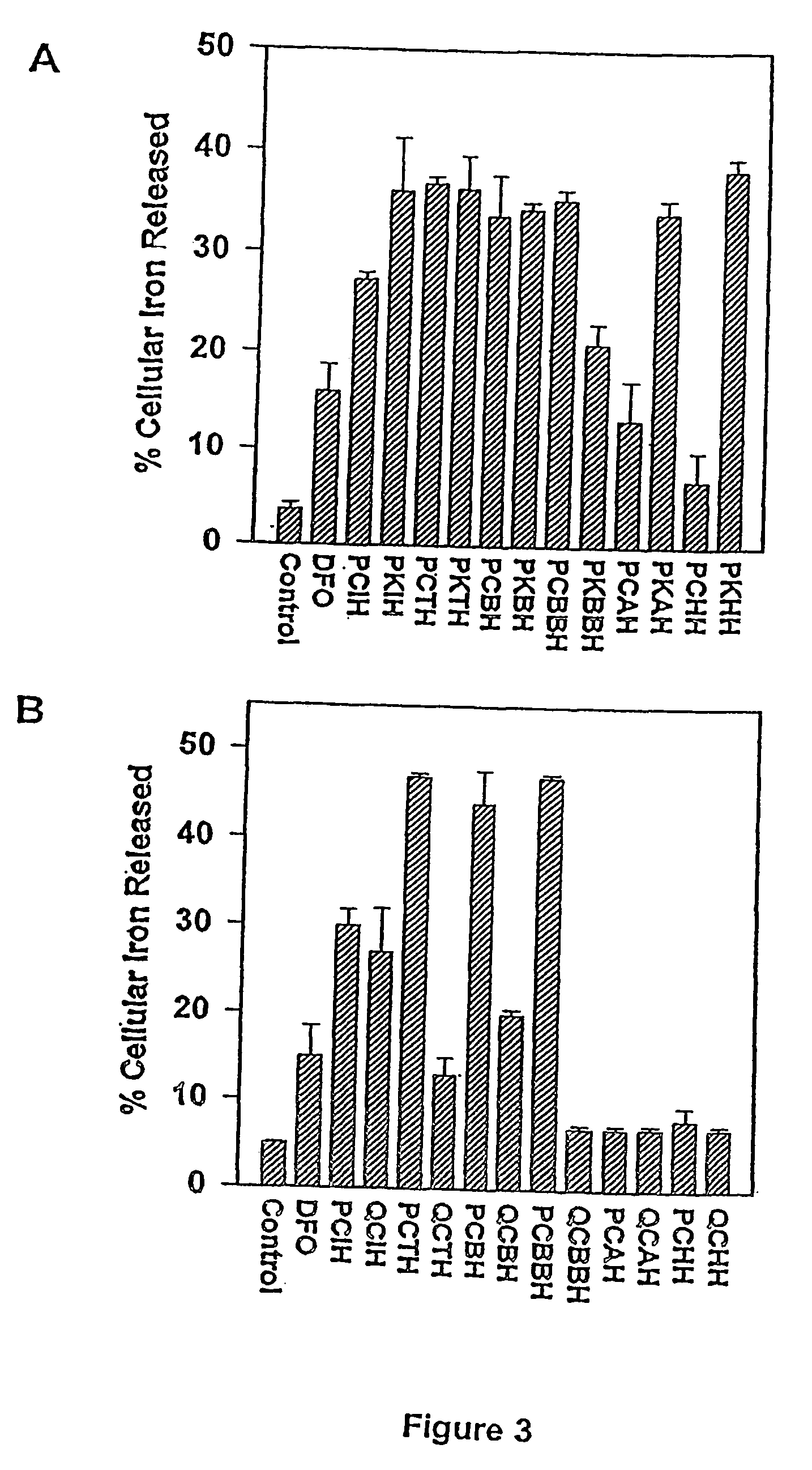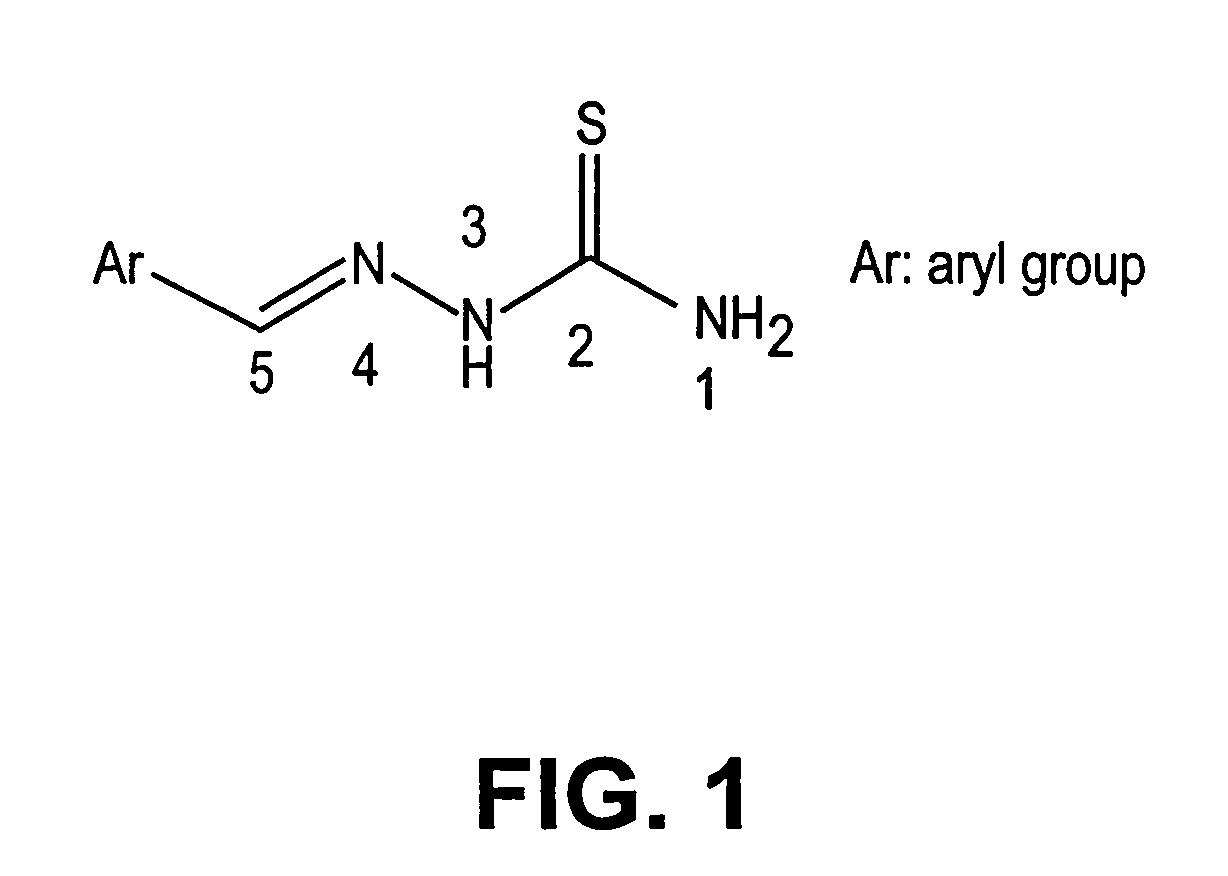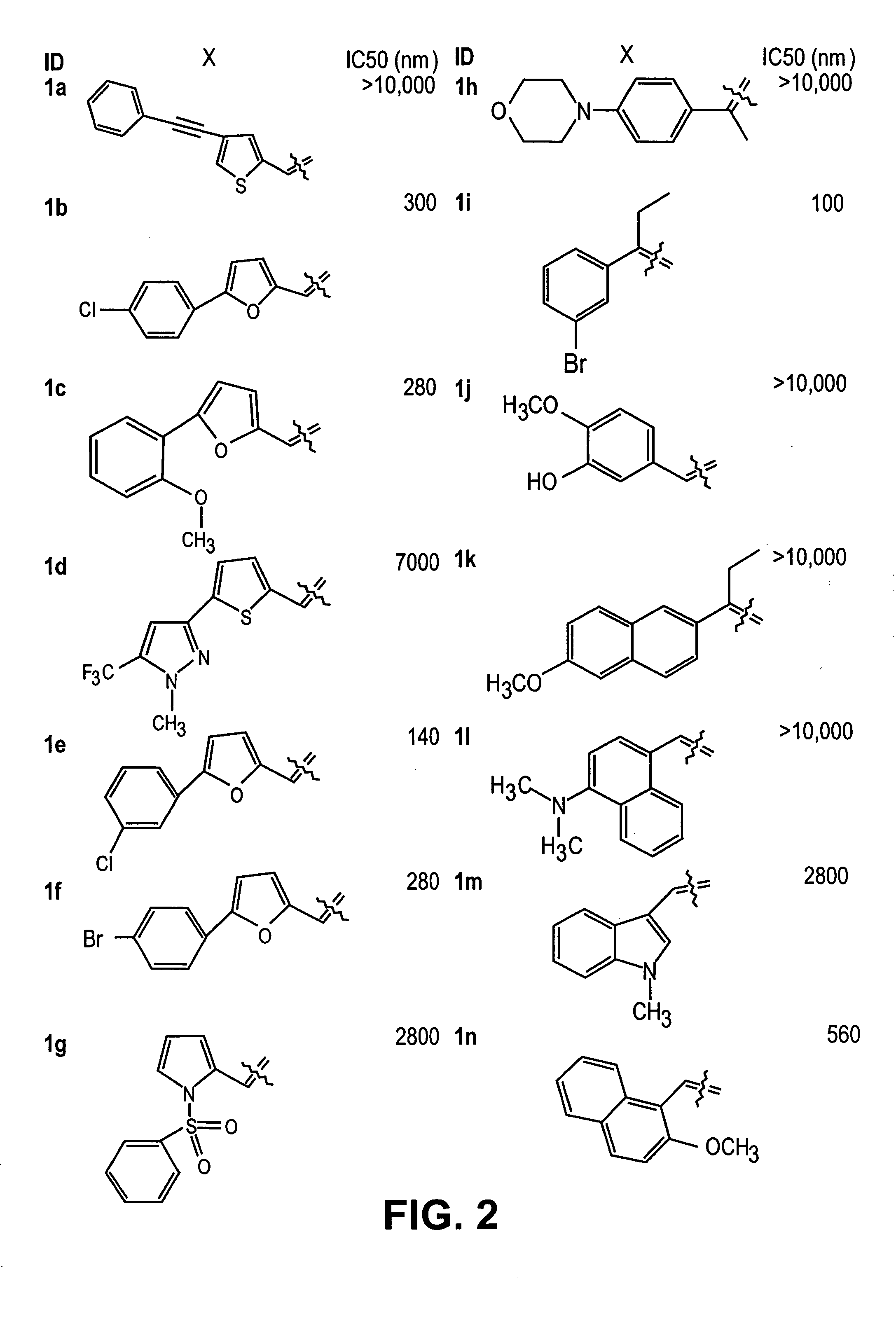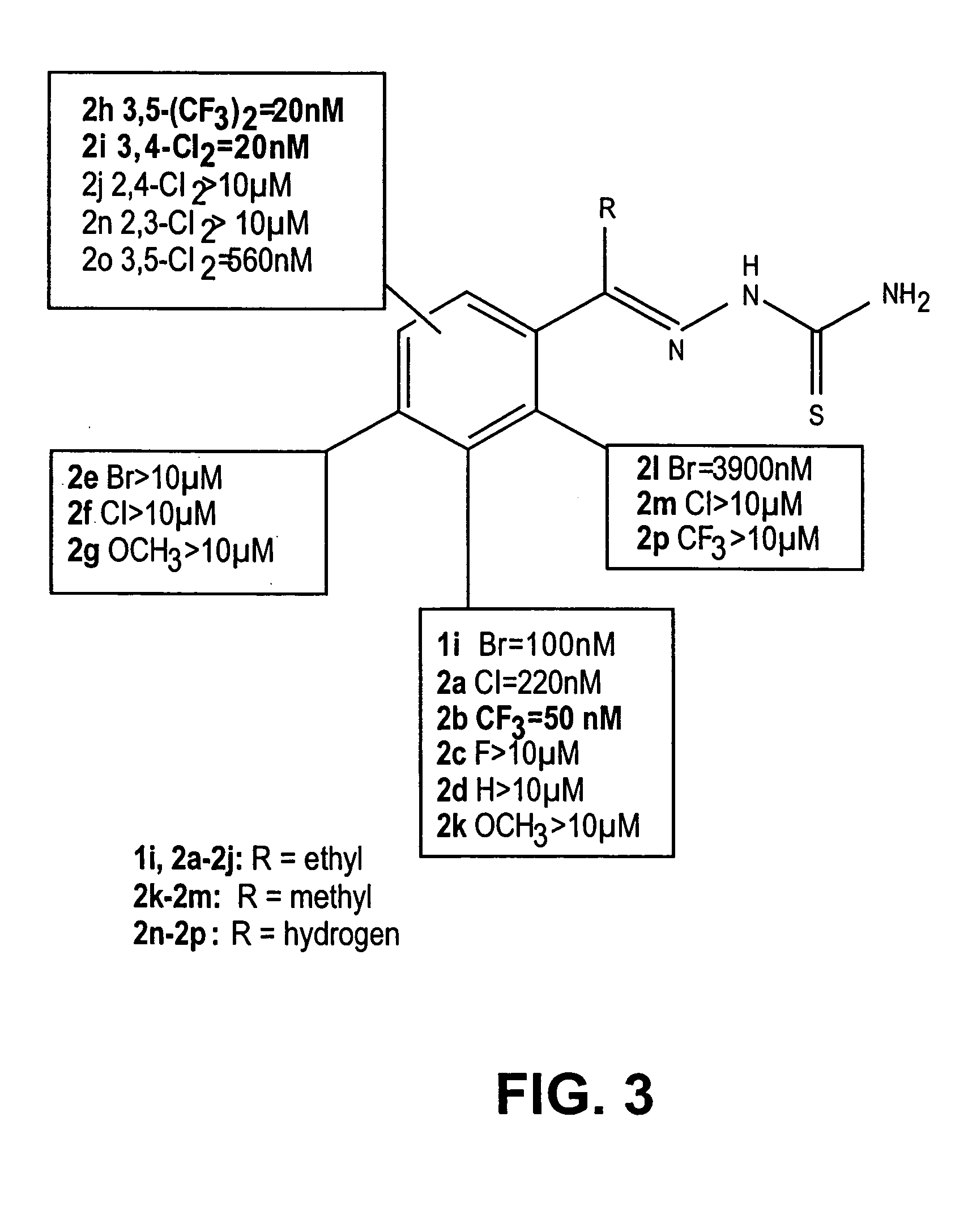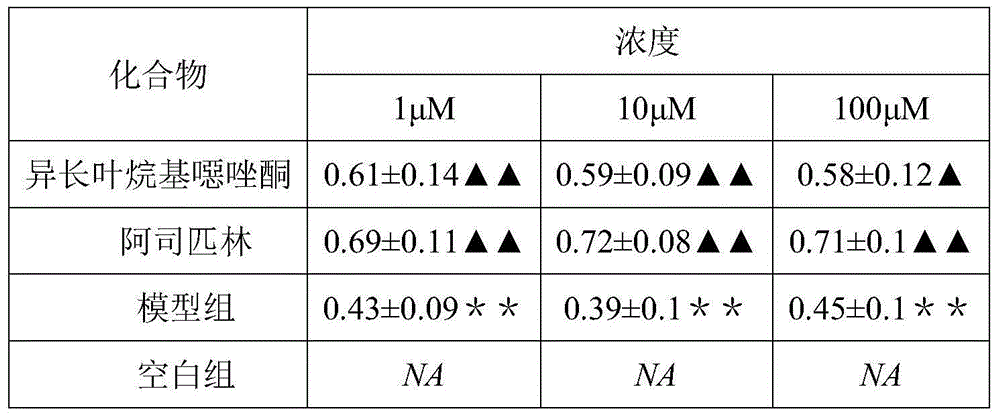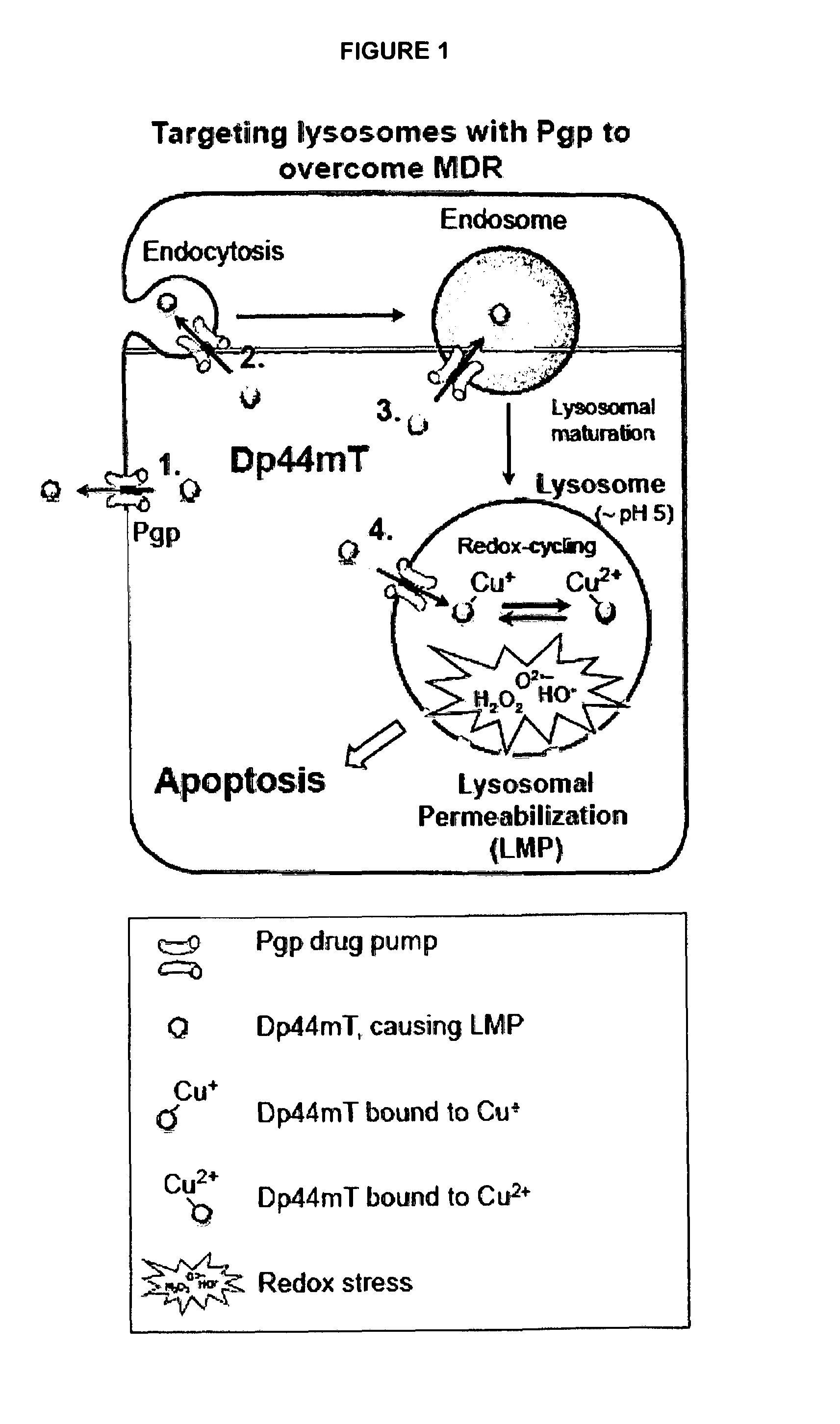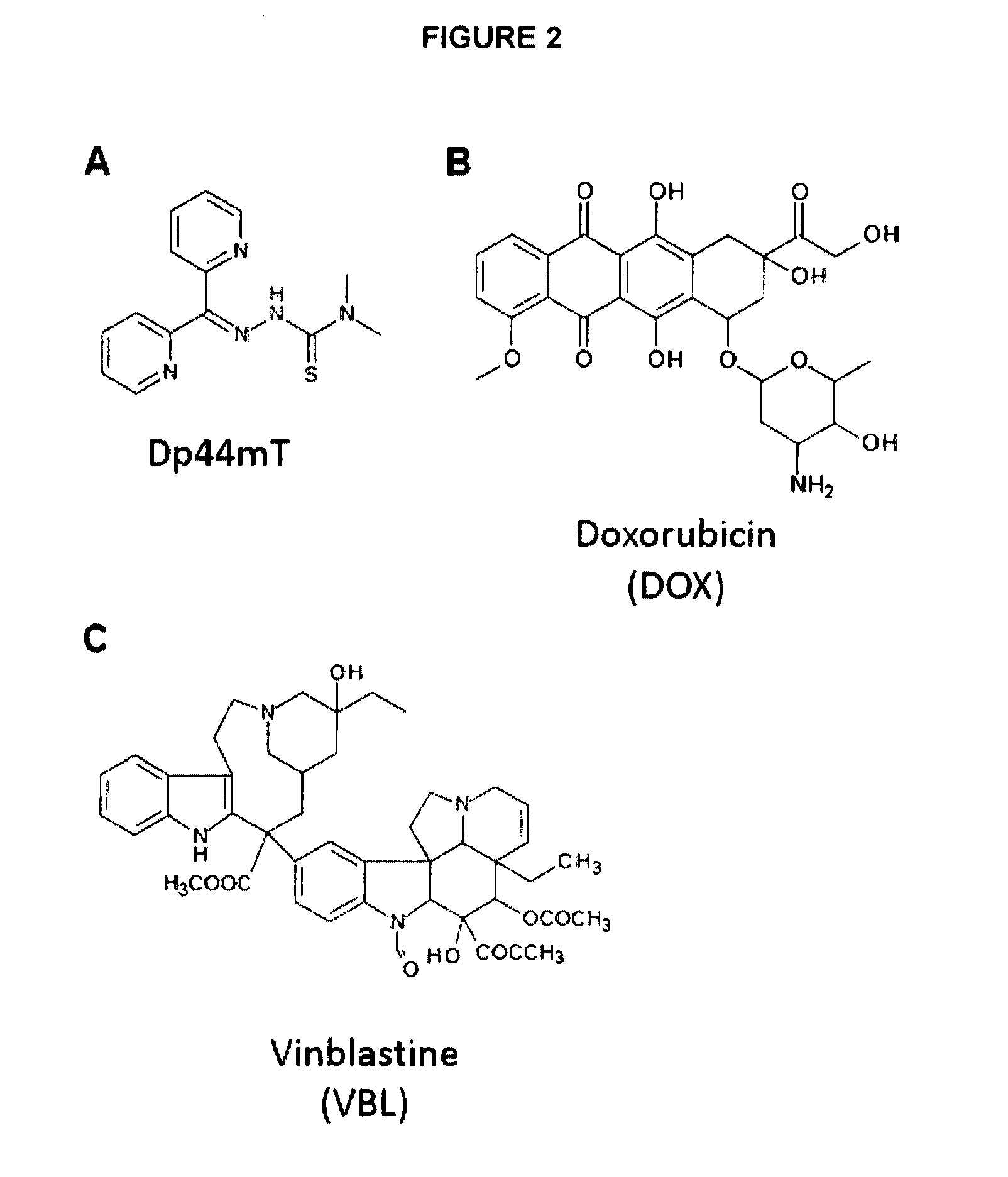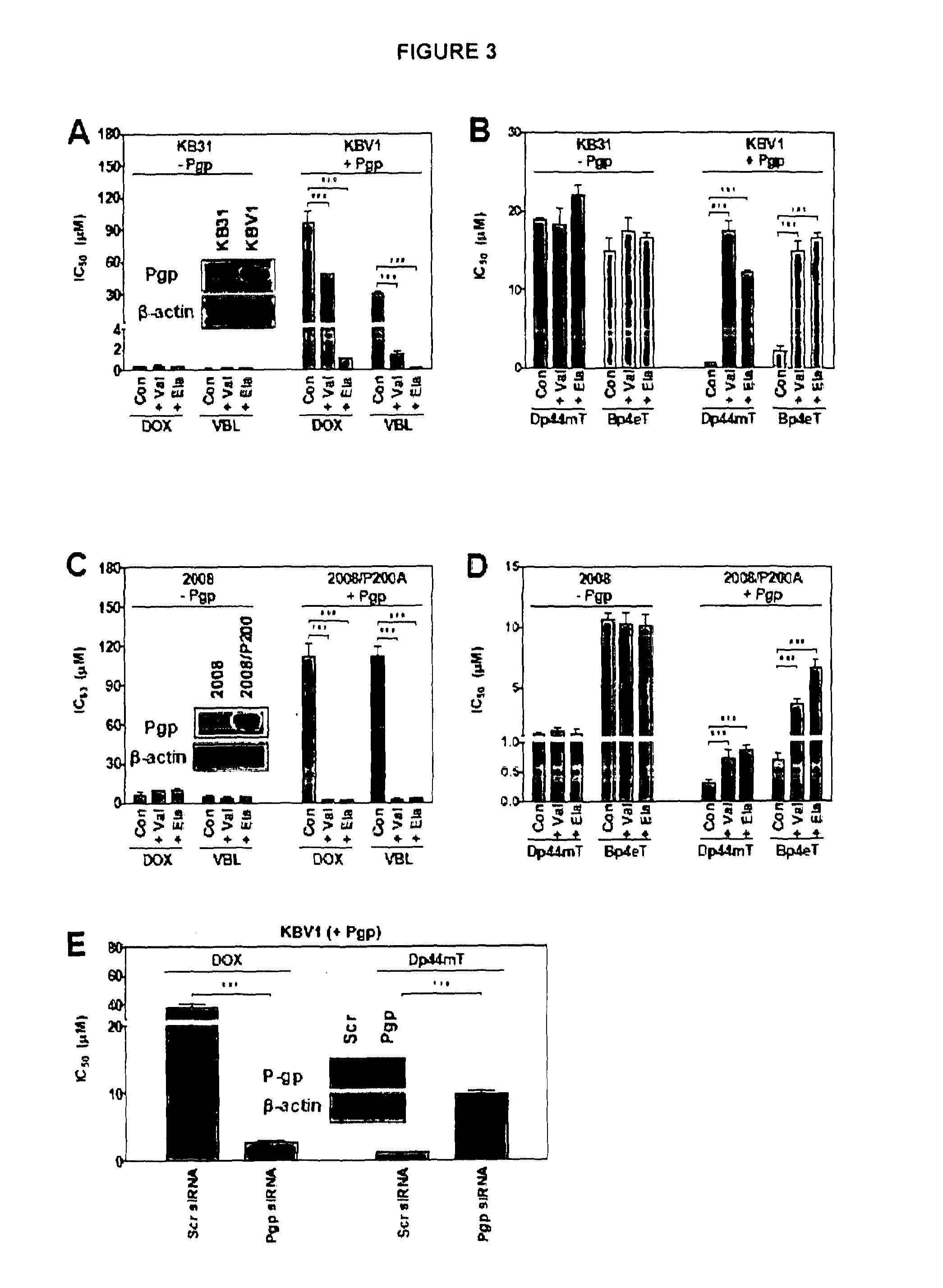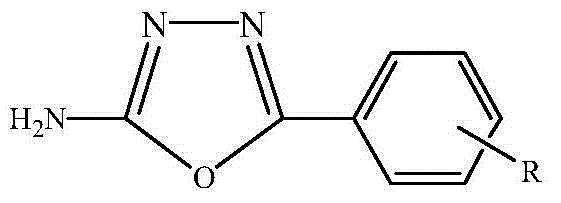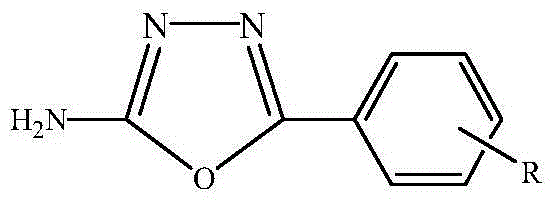Patents
Literature
75 results about "Semicarbazone" patented technology
Efficacy Topic
Property
Owner
Technical Advancement
Application Domain
Technology Topic
Technology Field Word
Patent Country/Region
Patent Type
Patent Status
Application Year
Inventor
In organic chemistry, a semicarbazone is a derivative of imines formed by a condensation reaction between a ketone or aldehyde and semicarbazide. They are classified as imine derivatives because they are formed from the reaction of an aldehyde or ketone with the terminal -NH₂ group of semicarbazide, which behaves very similarly to primary amines.
Therapeutic and diagnostic conjugates for use with multispecific antibodies
InactiveUS20050002945A1Low toxicityPromote localizationAntibacterial agentsAntimycoticsSemicarbazoneEther
Disclosed are compounds that include two or more haptens conjugated by a spacer or a carrier. The haptens may include diethylenetriaminepentaacetate (DTPA), histimine-succinyl-glutamine (HSG), or combinations of DTPA and HSG. The compound also includes an effector molecule which may be conjugated to one or more of the haptens, the spacer / carrier, or both. The effector molecule may be conjugated by a number of linkages including an ester linkage, an imino linkage, an amino linkage, a sulfide linkage, a thiosemicarbazone linkage, a semicarbazone linkage, an oxime linkage, an ether linkage, or combinations of these linkages. Also disclosed are methods of synthesizing the compounds and / or precursors of the compounds.
Owner:IMMUNOMEDICS INC
Carbocyclic and heterocyclic substituted semicarbazones and thiosemicarbazones and the use thereof
This invention is related to carbocyclic and heterocyclic substituted semicarbazones and thiosemicarbazones represented by Formula I: ##STR1## or a pharmaceutically acceptable salt or prodrug thereof, wherein: Y is oxygen or sulfur; R.sub.1, R.sub.21, R.sub.22 and R.sub.23 are independently hydrogen, alkyl, cycloalkyl, alkenyl, alkynyl, haloalkyl, aryl, aminoalkyl, hydroxyalkyl, alkoxyalkyl or carboxyalkyl; or R.sub.22 and R.sub.23, together with the N, form a heterocycle; A.sub.1 and A.sub.2 are independently aryl, heteroaryl, saturated or partially unsaturated carbocycle or saturated or partially unsaturated heterocycle, any of which is optionally substituted; X is one or O, S, NR.sub.24, CR.sub.25 R.sub.26, C(O), NR.sub.24 C(O), C(O)NR.sub.24, SO, SO.sub.2 or a covalent bond; where R.sub.24, R.sub.25 and R.sub.26 are independently hydrogen, alkyl, cycloalkyl, alkenyl, alkynyl, haloalkyl, aryl, aminoalkyl, hydroxyalkyl, alkoxyalkyl or carboxyalkyl. The invention also is directed to the use of carbocycle and heterocycle substituted semicarbazones and thiosemicarbazones for the treatment of neuronal damage following global and focal ischemia, for the treatment or prevention of neurodegenerative conditions such as amyotrophic lateral sclerosis (ALS), for the treatment and prevention of otoneurotoxicity and eye diseases involving glutamate toxicity and for the treatment, prevention or amelioration of pain, as anticonvulsants, and as antimanic depressants, as local anesthetics, as antiarrhythmics and for the treatment or prevention of diabetic neuropathy and urinary incontinence.
Owner:COCENSYS
Semicarbazone derivatives and application thereof
The invention belongs to the technical field of medicine, and relates to semicarbazone derivatives disclosed as general formula I, and geometrical isomer, pharmaceutically acceptable salt, solvate or prodrug thereof, wherein the substituent groups M, R1, R2, R and n are defined in the specification. The invention also relates to a method for preparing compounds disclosed as Formula I, a pharmaceutical composition containing the compounds and application of the compounds and pharmaceutical composition in preparing drugs for treating and / or preventing cancers and other hyperplastic diseases.
Owner:SHENYANG PHARMA UNIVERSITY
Antifungal agent-sulfur chromanone thiosemicarbazone compounds
ActiveCN101434595AAntifungalGood killing effectOrganic active ingredientsAntimycoticsAntifungalSide effect
The invention pertains to the technical field of medicaments, more particularly relates to a (sulfur) urea derivative with substituted semicarbazone thiochromanones and provides a novel and efficient antifungal agent. The structural formula of the derivative is shown as the Formula I. The invention also relates to a chemically acceptable compound of the derivative and a medicament combination taking the compound as an active ingredient. As a novel antifungal agent, the compound has relatively strong effect of killing pathomycete commonly seen clinically and is expected to overcome the defects that azoles antifungal medicaments widely used in clinical treatment has serious toxic side effect and is easy to generate medicament resistance, and the like. The compound is prepared by the condensation of substitutable thiochromanones and substitutable semicarbazone (sulfur) in an organic solvent.
Owner:SHENYANG PHARMA UNIVERSITY +1
Cis-trans isomerisation of semicarbazone compounds
ActiveCN1878752AOptically-active compound separationOrganic racemisationSemicarbazoneOrganic chemistry
The present invention relates to the isomerisation of the Z-isomer I-Z of semicarbazone compounds of the general formula (I) into its E-isomer I-E, where the variables in formula (I) have meanings given in claim 1.
Owner:BASF SE
Thio semicarbazone and semicarbazone inhibitors of cysteine proteases and methods of their use
The present invention relates to thio semicarbazone and semicarbazone inhibitors of cysteine proteases and methods of using such compounds to prevent and treat protozoan infections such as trypanosomiasis, malaria and leishmaniasis. The compounds also find use in inhibiting cysteine proteases associated with carcinogenesis, including cathepsins B and L.
Owner:RGT UNIV OF CALIFORNIA
Package and method of marketing
InactiveUS20120255502A1Forget the negative aspects of the treatmentBiocideEther/acetal active ingredientsMacrocyclic lactoneBULK ACTIVE INGREDIENT
A method of treatment and a package that is designed to accomplish this. The package provides the pet owner with a pack containing individual doses of topically applied medications pre-packaged with an oral taste treat. The topically applied medication contains at least one pharmaceutically active ingredient selected from the group of chemical families comprising phenylpyrazoles, macrocyclic lactones, neonicotinoids, synthetic pyrethroids, insect growth regulators, amidines, semicarbazones, spinosyns, octadepsipeptides, and pyrazinoisoquinolines, or any combination thereof. The treat can be administered either before the topically applied treatment is given so as to relax and distract the pet, or after the treatment is given so as to reward the pet and help it forget the stress of treatment. The treat can also be shaped to signify the type of animal to be treated.
Owner:ALLEVA ANIMAL HEALTH
Device for presentation of polypeptides able to be used as a chip for miniaturised detection of molecules
InactiveUS20040235049A1Reduces non-specific adsorptionHigh densityBioreactor/fermenter combinationsBiological substance pretreatmentsSemicarbazoneOrganic chemistry
The invention concerns a device for presentation of peptides or of proteins, which can be used as a "polypeptide chip" for the miniaturised detection of molecules structurally or functionally complementary to the said polypeptides. This device consists of a flat support onto which the polypeptides are covalently bonded, this bonding between the polypeptides and the support resulting from the formation of a semicarbazone bond. The semicarbazone bond results in particular from the reaction between polypeptides bearing an aldehyde or ketone function and a support functionalised with semicarbazide groups. The invention also concerns the process for preparation of the supports and for attaching polypeptides onto these supports and also the use of the devices thus obtained as polypeptide chips.
Owner:CENT NAT DE LA RECHERCHE SCI +4
Semicarbazones having CNS activity and pharmaceutical preparations containing same
InactiveUSRE38425E1Good anticonvulsive activityAcceptable neurotoxicityBiocideNervous disorderPharmaceutical medicineAnti convulsants
A compound of general formula I below useful as an anticonvulsant for disorders of the central nervous system: ##STR1## wherein: R.sup.1, R.sup.2, R.sup.3 and R.sup.4 may be the same or different and each represents a hydrogen or halogen atom, or a C.sub.1-9 alkyl, C.sub.3-9 cycloalkyl, cyano, C.sub.1-9 alkoxy or C.sub.6-10 aryloxy group; R.sup.5 represents a hydrogen atom or a C.sub.1-9 alkyl, C.sub.3-9 cycloalkyl or C.sub.6-10 aryl group; and X is oxygen or sulfur; or a pharmaceutically-acceptable salt thereof. The compound may be adimistered orally for treating convulsions in humans or animals.
Owner:UNIV OF SASKATCHEWAN TECH
Compounds and method for treatment of cancer
Owner:CRITICAL OUTCOME TECH
Compound azo salicyl aldehyde semicarbazone mercaptothiodiazole and preparation and application thereof
InactiveCN102127035AHigh detection sensitivitySignificant colorimetric recognition effectOrganic chemistryMaterial analysis by observing effect on chemical indicatorAnti jammingSemicarbazone
The invention discloses recognition receptor compound azo salicyl aldehyde semicarbazone mercaptothiodiazole, namely 2-(2-hydroxyl-5-(4-nitrobenzophenone azo)-benzyl methyleneamino)-5-hydrosulphonyl-1,3,4-thiodiazole taking phenolic hydroxyl and dimercaptothiodiazole as recognition groups and taking p-nitroazo phenyl as a signal reporting group. Colorimetric recognition and ultraviolet-visible absorption spectrum research indicate that the receptor compound has a remarkable colorimetric recognition effect on Ac<-> in a water containing system of dimethyl sulfoxide; meanwhile, an ultraviolet titration experiment indicates that the receptor has very strong complexing capability on the Ac<->; moreover, the receptor has very high detection sensitivity to the Ac<->, and the minimum detection limit is up to 1.0*10 <-6> mol.L<-1>. An experiment also proves that the receptor compound has high single selectivity recognition capability on the Ac<-> in the water containing system of dimethyl sulfoxide and very high anti-jamming capability on other negative ions.
Owner:NORTHWEST NORMAL UNIVERSITY
Semicarbazide derivatization reagent and rapid detection card thereof
InactiveCN106093379ASimplify separabilitySimplified purification stepsMaterial analysisFuranBenzoic acid
The invention relates to a semicarbazide derivatization reagent and a rapid detection card thereof. The derivatization reagent is aldehyde benzoic acid with a specific small molecular marker, the aldehyde benzoic acid can react with the amino of a metabolite through a aldehyde group to form a metabolite-aldehyde benzoic acid derivative with a specific molecular marker, the specific molecular marker can bind with a ligand on a magnetic bead, through magnetic bead separation, a semicarbazide derivatization product marked magnetic bead can be obtained, and the magnetic bead can be added dropwise directly on a rapid chromatographic card to perform detection. The reagent provided by the invention utilizes the advantages of lateral chromatography, simplifies the separation and purification steps of furan characteristic metabolite derivatives, and reduces the detection time and operation error.
Owner:GUANGZHOU INST OF BIOMEDICINE & HEALTH CHINESE ACAD OF SCI
High strength polyisobutylene polyurethanes
Owner:UNIV OF MASSACHUSETTS
New molecule of PH fluorescent probe
InactiveCN102320991AHigh sensitivityUndisturbedFluorescence/phosphorescenceLuminescent compositionsSemicarbazoneSalicylaldehyde
The invention, belonging to the field of chemistry, relates to a new compound, a new molecule of a PH fluorescent probe, characterized in that: a light pink acicular crystal synthesized by 1,8-dinaphthylamine and salicylaldehyde is used, the chemical name of the crystal is N,N'-bis(salicylaldehyde semicarbazone)-1,8-dinaphthylamine. Compared with the prior art, the new molecule has narrow PH response range, high sensitivity, and no background interference, and is suitable for the PH detection in strong acid environment. According to the invention, the application range is wide, especially theapplication in the life field is broadened, or has important value in precise determination of PH of cell sap in the fields of sports medicine and sports biochemistry.
Owner:NANYANG NORMAL UNIV
Detection method for liquid chromatography tandem mass spectrometry of semi carbazide
InactiveCN104569168AHigh sensitivityLow detection limitComponent separationContaminated foodFood contaminant
The invention belongs to the field of detection of food contaminant semi carbazide (SEM). The method comprises the following steps: adding 0.2 mol / L hydrochloric acid hydrolysis solution, a 2-nitrobenzaldehyde derivating agent and an internal standard substance into a sample to perform SEM hydrolysis and derivatization, centrifuging, taking supernate, adjusting the pH value of the supernate to be neutral, allowing the supernate to pass a Poly-Sery HLB solid-phase extraction small column, performing eluting through methyl alcohol, gathering eluted liquid nitrogen, blowing the eluted liquid nitrogen to be dry, fixing the volume through 10 percent of an acetonitrile solution, filtering the eluted liquid nitrogen through a 0.22-micron film, and allowing the eluted liquid nitrogen to enter a liquid chromatography tandem mass spectrometer to be detected. Liquid chromatography adopts an XBirdge BEH Amide normal-phase chromatographic column, and acetonitrile and pure water of which volume ratio is 80 to 20 serve as mobile phases; mass spectrometry adopts an electrospray positive ion mode and a multi-reaction monitoring scanning way. The lowest detection limit is 0.01 microgram / kg. The invention discloses an SEM detection method with high detection speed, high sensitivity and low detection cost.
Owner:苏州市产品质量监督检验所 +2
Preparation of 1-amino hydantoin derivative hapten, antigen and antibody
InactiveCN101412697AStrong specificityMonitor illegal useSerum immunoglobulinsSerum albuminHydantoin derivativesCarboxyl radical
The invention discloses a method for preparing a hapten, an antigen and an antibody of a 1-amino-hydantoin derivative, wherein the hapten of a semicarbazide derivative is obtained after the aldehyde condensation between semicarbazide and carboxyl benzaldehyde ammonia, and the structure of the hapten is similar to that of the semicarbazide derivative, thus the antigenic determinant with the molecular specificity of a veterinary drug is highlighted, and the antigen is prepared from the coupled carrier protein by an active ester method. The antigen is used to immunize experimental animals to obtain the antibody which aims at the semicarbazide derivative and has high titer and good specificity. The antibody can be applied to the fast detection of semicarbazide residual quantity in animal derived food, and the lower limit of the detection can reach 0.09 nanogram per milliliter.
Owner:SOUTH CHINA AGRI UNIV
Cycloxaprid insecticidal composition
ActiveCN103843802AHigh activityGood control effectBiocideAnimal repellantsSemicarbazoneCarbamate insecticide
A provided cycloxaprid composition insecticide comprises cycloxaprid and a second active ingredient with a weight ratio of 60:1-1:60. The second active ingredient is any one or a mixture of any several selected from benzoylurea growth regulators, pyridazinone growth regulators, semicarbazone insecticides, pyridinecarboxamide insect growth regulators and carbamate insecticides. The cycloxaprid composition insecticide has the co-toxicity coefficient (CTC) obviously higher than 100, has obvious synergic effect and additive effect, and helps to obviously reduce the use amount of pesticides.
Owner:SHANGHAI SHENGNONG PESTICIDE
Synthesis method of indoxacarb intermediate semicarbazone
ActiveCN106928098ALow costAvoid Yield ProblemsUrea derivatives preparationOrganic compound preparationSynthesis methodsHydrazine compound
The invention discloses a synthesis method of an indoxacarb intermediate semicarbazone. The synthesis method includes the steps of producing 4-trifluoromethoxy phenylurea from 4-trifluoromethoxyaniline and isocyanate under the action of acetic acid; enabling the 4-trifluoromethoxy phenylurea and hydrazine hydrate to undergo hydrazinolysis in an organic solvent so as to obtain 4-trifluoromethoxy phenylamino hydrazide; enabling the 4-trifluoromethoxy phenylamino hydrazide and 5-chloro-1,3-dihydro-2-hydroxy-1-oxo-2H-indene-2-carboxylic acid methyl ester in an organic solvent under the action of a catalyst. The synthesis method has the advantages that the intermediate semicarbazone is synthesized from industrially available isocyanate through a series of conversion, and accordingly the synthesis method is free of toxic substances and phosgene products and capable of avoiding the shortcomings of high cost and low yield when precious metals serve as catalysts as well as overcoming the technical defect of low ring-closure reaction yield; the synthesis method is high in safety and is economical and high in yield when used for synthesizing indoxacarb atoms.
Owner:JIANGSU YOUJIA CHEM
Palladium complexes of 2-benzoylpyridine thiosemicarbazone and synthesis method thereof
ActiveCN110713500AStrong inhibitory activityLittle toxicityGroup 8/9/10/18 element organic compoundsAntineoplastic agentsSemicarbazoneThio-
The invention discloses palladium complexes of 2-benzoylpyridine thiosemicarbazone and a synthesis method of the palladium complexes. The method comprises the following steps: respectively mixing andreacting 2-benzoylpyridine with 4,4-dimethyl-3-thiosemicarbazone and 3-pyrrole-3-thiosemicarbazone to prepare a ligand; and reacting the prepared ligand with PdCl2 to obtain the palladium complexes C1and C2. In-vitro proliferation inhibition activity experiments are further carried out on the synthesized palladium complexes C1-C2, and the results show that the synthesized palladium complexes havegenerally good in-vitro activity, show good inhibition activity, have little toxic effect on human normal cells, and are suitable for preparing high-efficiency and low-toxicity anti-tumor drugs.
Owner:GUANGXI NORMAL UNIV
Preparation method and application of 2-(4-beta-D-allose pyranoside-phenyl)-2,3-dihydroquinoline-4(1H) and 2-(4-(2,3,4,6-tetrabenzyl)-beta-D-allose pyranoside-phenyl)-2,3-benzodihydropyran
The invention relates to a preparation method and an application of 2-(4-beta-D-allose pyranoside-phenyl)-2,3-dihydroquinoline-4(1H) (1) and 2-(4-(2,3,4,6-tetrabenzyl)-beta-D-allose pyranoside-phenyl)-2,3-benzodihydropyran (2). The invention discloses helicide derivatives with a central nervous system improving function, and a preparation method thereof. The compounds provided by the invention have good sedative, sleep-promoting, and convulsion-inhibiting functions. The compounds are collected in a Year 2000 version of Pharmacopoeia of PRC with a medicine name of helicide tablets. The helicide derivative novel medicines are represented by chemical formulas (1) and (2), wherein R1 can be hydrogen and acetyl, and R2 can be semicarbazide, hydroxylamine, and methoxylamine. Acording to the helicide derivatives provided by the invention, a plant active monomer helicide with sedative, sleep-promoting, and convulsion-inhibiting functions is adopted as a matrix compound, structural modification is carried out according to a medicine efficacy molecular principle, and compounds with high activities for improving central nervous system functions are designed and prepared.
Owner:SICHUAN UNIV
Cornfield herbicidal composition and application thereof
ActiveUS20190124925A1Effective preventionEfficient removalBiocideDead animal preservationCarboxylic acidBULK ACTIVE INGREDIENT
A cornfield herbicidal composition comprising pyrazolone compounds and an application thereof is provided. The cornfield herbicidal composition comprises an herbicidally effective amount of an active ingredient A, an active ingredient B, and a safener compound C, wherein the active ingredient A is a compound of the formula (I); the active ingredient B is selected from one or more of the following compounds: triazines, nitriles, sulfonylureas, pyridine carboxylic acids, benzyl carboxylic acids, bentazone, amides, pyridines and amicarbazone; and the safener compound C is selected from one or more of the following compounds: C1 isoxadifen-ethyl, C2 cyprosulfamide, C3 mefenpyr-diethyl, C4 cloquintocet-mexyl, C5 gibberellic acid, C6 furilazole and C7 N-(2-methoxybenzoyl)-4-[(methylaminocarbonyl)amino]benzenesulfonamide. The composition can effectively prevent and remove weeds in the cornfield, and has the characteristics of extending the weed control spectrum, reducing the application dose, being safe for crops, being able to remove resistant weeds and the like.
Owner:QINGDAO KINGAGROOT RESISTANT WEED MANAGEMENT CO LTD
Semicarbazide (SEM) derivatization reagent and application method thereof
The invention relates to a semicarbazide derivatization reagent and a kit and application thereof in sandwich ELISA (enzyme-linked immuno sorbent assay) detection of semicarbazide. The reagent is aldehyde benzoic acid with a specificity small-molecular marker; and the aldehyde benzoic acid forms a semicarbazide-aldehyde benzoic acid derivative with a specificity small-molecular marker through amino reaction between aldehyde and semicarbazide. The semicarbazide derivatization reagent provided by the invention can simplify the separation and purification steps of semicarbazide derivative, avoids preparation and application of semicarbazide hapten, and can realize detection of a sandwich ELISA method so as to greatly simplify the detection steps, reduce the detection time and operation error and enhance the detection stability, precision and sensitivity.
Owner:北京鑫开元医药科技有限公司
Insecticidal composition containing ZJ3265 and profenofos
The invention discloses an agricultural insecticidal composition, comprising two active ingredients of a first active ingredient semicarbazone pesticide ZJ3265 and the other active ingredient profenofos. A ratio of the ZJ3265 to the profenofos is1:50 to 50:1, based on active ingredient weight part. The invention also discloses a pesticide, based on active ingredient, containing 0.5-95wt% of the insecticidal composition. The insecticidal composition provided by the invention has substantial synergism, and is especially suitable for controlling lepidoptera insects of rice leaf roller, chilo suppressalis and yellow rice borer, etc.
Owner:SINOCHEM LANTIAN +1
Semicarbazone compound preparation method and application in biomedicine
InactiveCN105017197ARegulate active oxygen in the bodyEasy to operateNervous disorderOrganic chemistryEnantiomerOxygen
The present invention provides a semicarbazone compound preparation method and application in biomedicine. The compound is a compound of formula (I) or an enantiomer, a diastereomer, a raceme, a pharmaceutically acceptable salt, a crystalline hydrate or a solvate thereof. The compound has the formula shown in the description, wherein X is sulfur or oxygen; R1 and R2 are separately and independently hydrogen and alkyl containing 1-3 carbon atoms or N=CHR 5, wherein R5 is optionally substituted aryl or optionally substituted alkyl; R3 and R4 are separately and independently hydrogen or alkyl containing 1-3 carbon atoms or substituents selected from formulas III, III, IV, and V shown in the description, wherein X1 is sulfur or oxygen. Y, Y1 and Y2 are separately and independently at least one of hydrogen, alkyl containing 1-3 carbon atoms, halogen, hydroxy, methoxy, amino, sulfonic acid group, nitro, carboxyl, thiol, methylamino, ethylamino, dimethylamino or diethylamino; and Z1 is hydrogen, alkyl containing 1-3 carbon atoms, halogen, hydroxy, amino, methylamino, ethylamino, dimethylamino or diethylamino. The semicarbazone compound is applicable to related diseases caused by copper metabolic dysfunction.
Owner:HUAZHONG NORMAL UNIV
Semicarbazone synthesis method
InactiveCN1762989ACondensation reaction bubble reductionHigh yieldUrea derivatives preparationOrganic compound preparationSolubilitySynthesis methods
The synthesis process of semicarbazone includes the following steps: 1. reaction of hydrazine hydrate and urea at 90-100 deg.c and regulating the pH value of the reacted liquid with concentrated hydrochloric acid to 3-4; and 2. adding aldehyde and ionic liquid to the reacted liquid, reflux reaction, cooling and filtering to obtain the destination compound. The synthesis process is superior in that the ionic liquid has less trend of volatilization, combustion and explosion, excellent dissolving property on both organic and inorganic matters, and easy recovering, and the reaction in homogeneous phase condition is easy to operate and high in yield; that the condensation may be microwave heated for shortened reaction time, raised yield, high product purity and low power consumption; and that the condensation may be ultrasonically promoted.
Owner:ZHEJIANG UNIV OF TECH
Metal ion chelators and therapeutic use thereof
The present invention relates to compounds which are capable of chelating metal ions. In particular, the present invention relates to (thio)semicarbazone compounds and (thio)hydrazone compounds which are capable of chelating metal ions, including iron ions. Also disclosed are therapeutic use of such compounds and / or their metal ion complexes, including methods of treating diseases associated with cell proliferation.
Owner:LOVEJOY +1
Thio semicarbazone and semicarbozone inhibitors of cysteine proteases and methods of their use
Owner:RGT UNIV OF CALIFORNIA
Isolongifolene alkyl oxazolone as well as synthesis method and application thereof
The invention discloses isolongifolene alkyl oxazolone as well as a synthesis method and an application thereof. The molecular formula of the isolongifolene alkyl oxazolone is C18H27N302, the molecular weight is 317.21, the physical state of the isolongifolene alkyl oxazolone is a white solid, and m.p. is 202 DEG C. The synthesis method comprises steps as follows: isolongifolanone is taken as a raw material and subjected to condensation through semicarbazide hydrochloride, and then semicarbazone is obtained; then the isolongifolene alkyl oxazolone is obtained through ring formation under the condition of reflux of absolute ethyl alcohol. The isolongifolene alkyl oxazolone shows good activity on inflammation elimination of cells and is a potential anti-inflammatory compound.
Owner:扬州胜宁信息技术有限公司
Chemotherapy for Drug-Resistant Cancer Cells
The present invention relates to new treatments of multidrug resistant disorders, particularly cancers. There is provided a method of treating a cancer including administering an effective amount of a semicarbazone or hydrazone compound to a patient that has cancer, the cancer including a cancerous cell that includes an active efflux mechanism; wherein the compound is a substrate of the active efflux mechanism and the compound is able to form a chelation complex with a metal species in the cancerous cell, the chelation complex being cytotoxic to the cancerous cell.
Owner:ONCOCHEL THERAPEUTICS
2-amido-5-substituted-1,3,4-oxadiazole as well as preparation method and application thereof
ActiveCN103980222ASatisfy needsSimple and Green Synthetic MethodAntibacterial agentsOrganic active ingredientsSemicarbazoneFiltration
The invention relates to 2-amido-5-substituted-1,3,4-oxadiazole as well as a preparation method and application thereof. The preparation method comprises the following steps: adding semicarbazone, manganese dioxide and pyridine into a reaction vessel, reacting at 100-120 DEG C, and monitoring the reaction by using TLC (Thin Layer Chromatography) till the raw material point of the semicarbazone disappears in a reaction process to obtain a reaction mixture; cooling the reaction mixture to room temperature, concentrating filter liquor obtained through decompressed suction filtration to be dry to obtain a solid, carrying out washing and the decompressed suction filtration on the solid to obtain a crude product, and recrystallizing the crude product to obtain the 2-amido-5-substituted-1,3,4-oxadiazole. The compound disclosed by the invention can be applied as a gram-negative bacteria resistant medicament or applied to a fluorescent material. The preparation method disclosed by the invention has the advantages of easiness and convenience for operation, higher productivity, recycling and reutilization of a catalyst, safety and environmental friendliness, meets the requirement for industrial production and is an economical, simple, convenient and environment-friendly synthetic method.
Owner:SHAANXI UNIV OF SCI & TECH
Features
- R&D
- Intellectual Property
- Life Sciences
- Materials
- Tech Scout
Why Patsnap Eureka
- Unparalleled Data Quality
- Higher Quality Content
- 60% Fewer Hallucinations
Social media
Patsnap Eureka Blog
Learn More Browse by: Latest US Patents, China's latest patents, Technical Efficacy Thesaurus, Application Domain, Technology Topic, Popular Technical Reports.
© 2025 PatSnap. All rights reserved.Legal|Privacy policy|Modern Slavery Act Transparency Statement|Sitemap|About US| Contact US: help@patsnap.com
